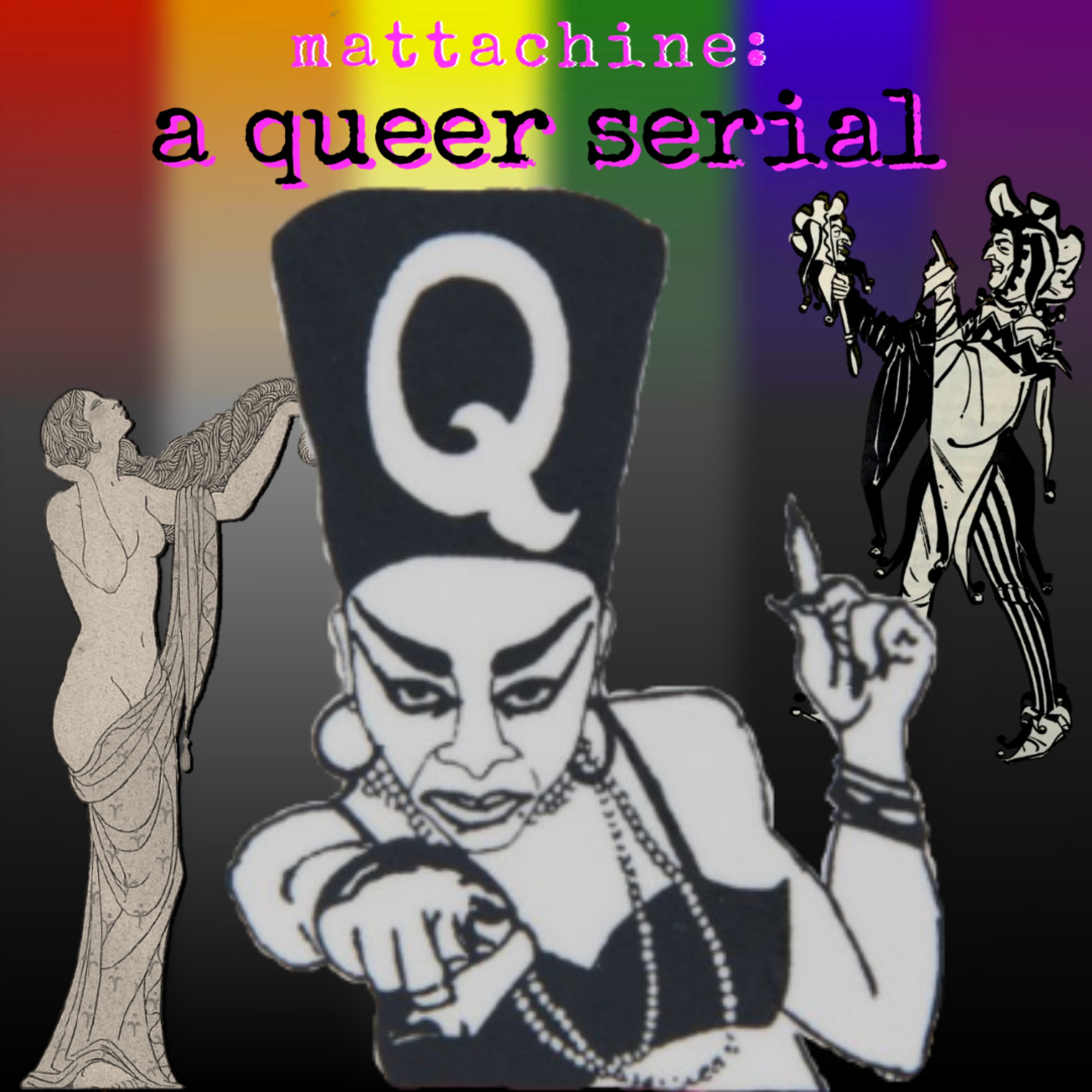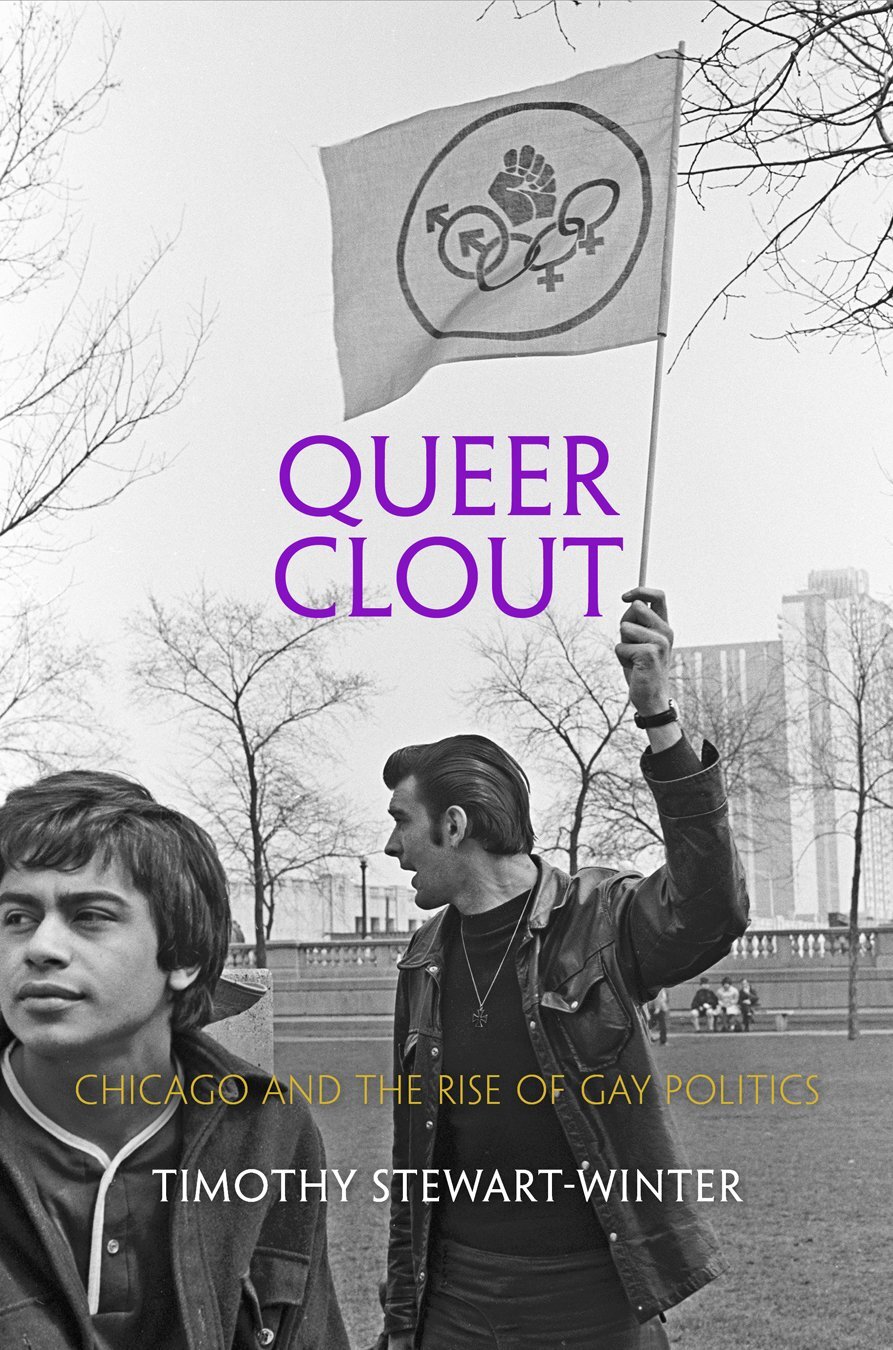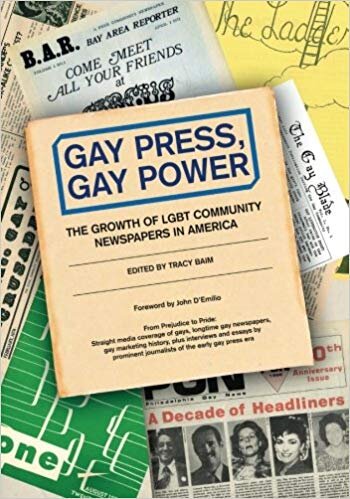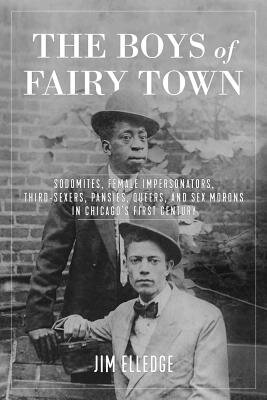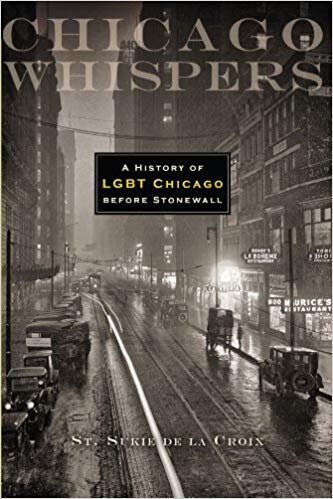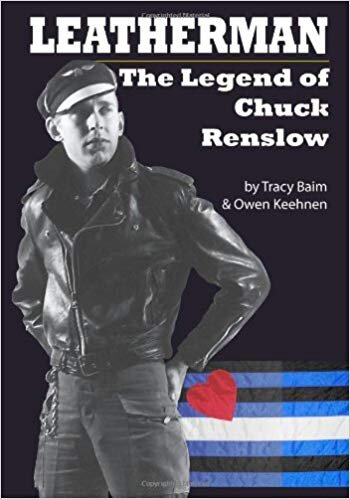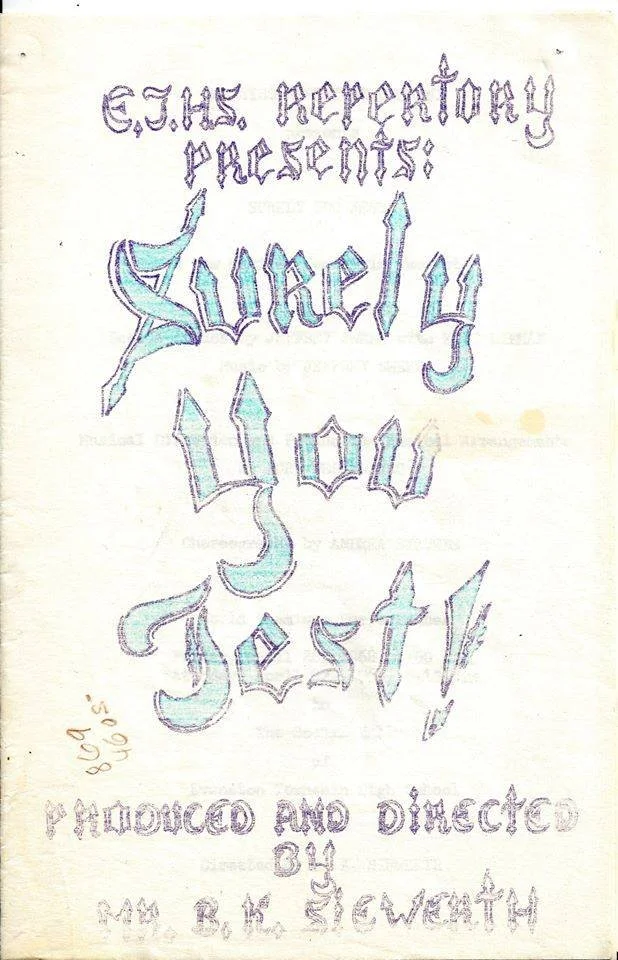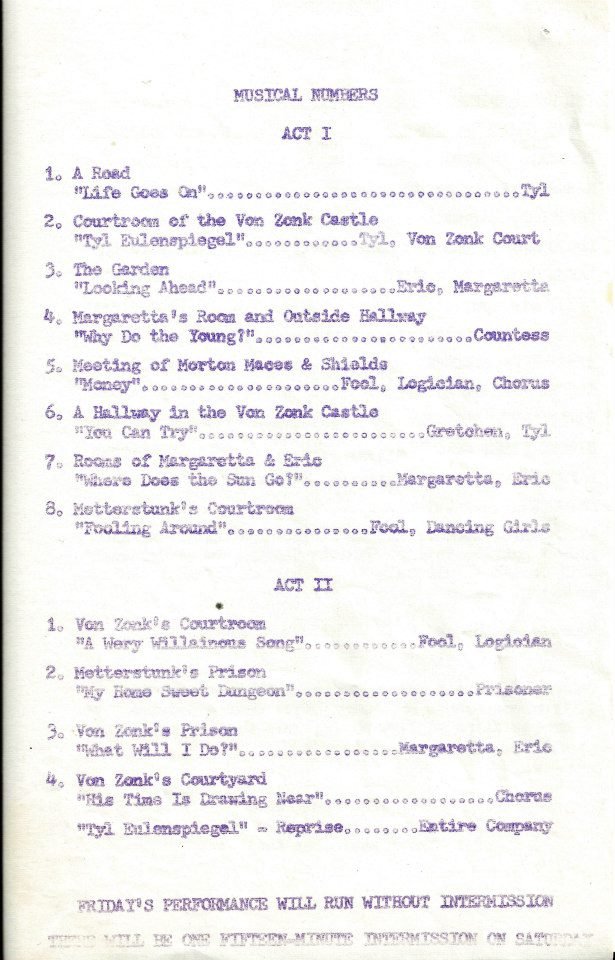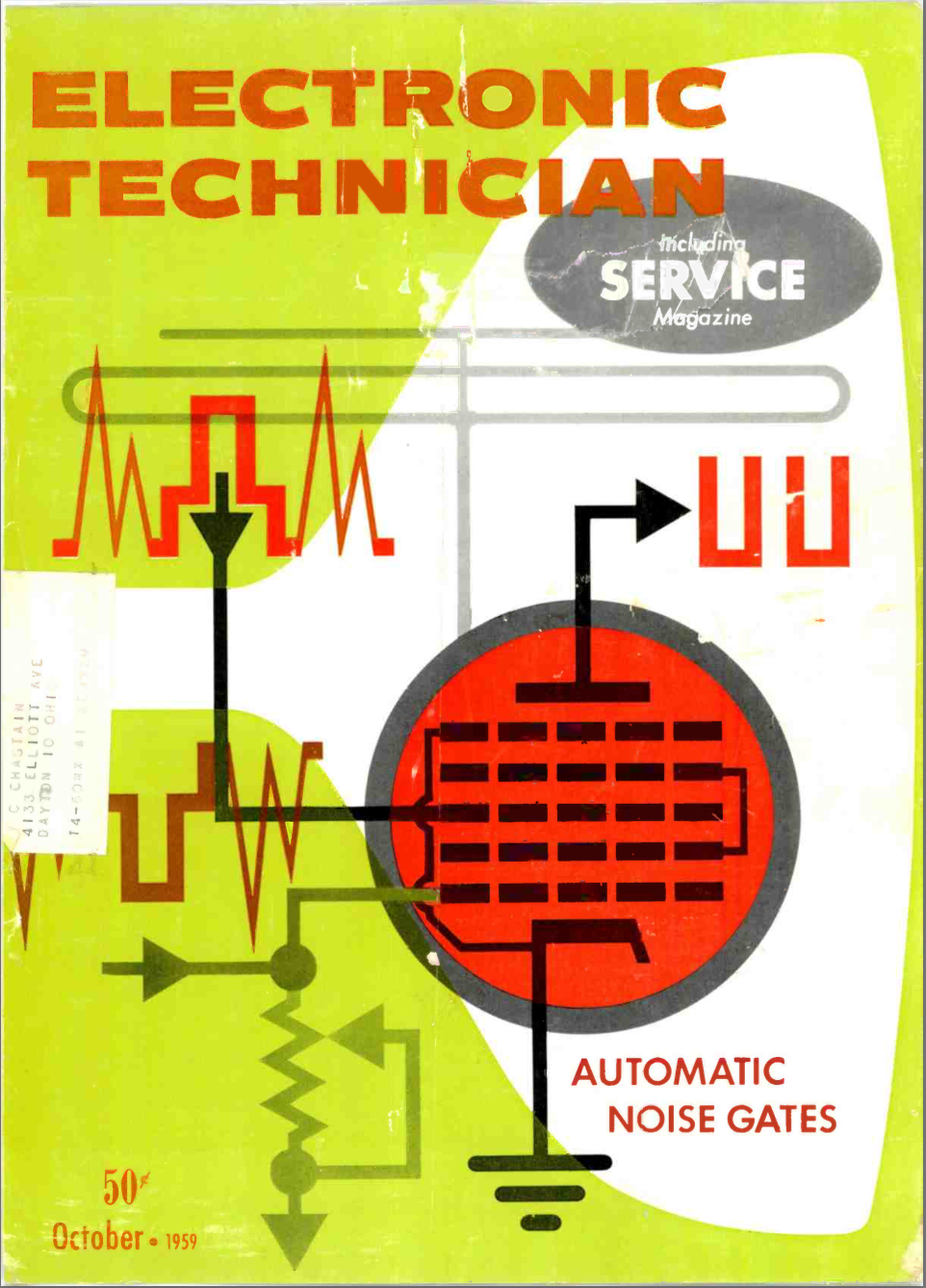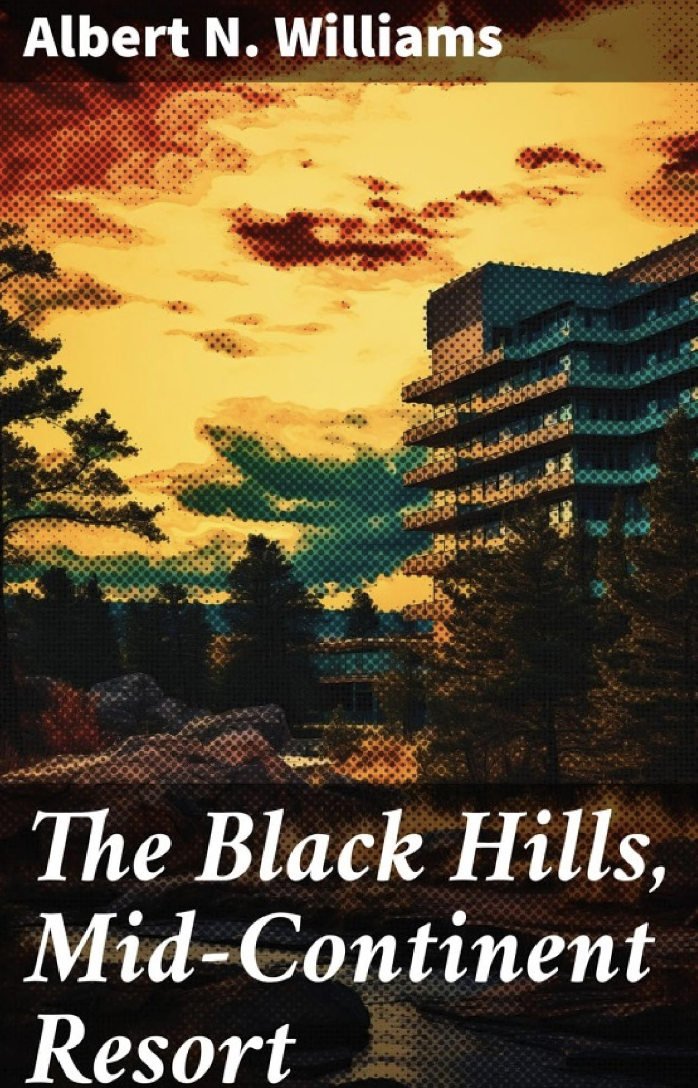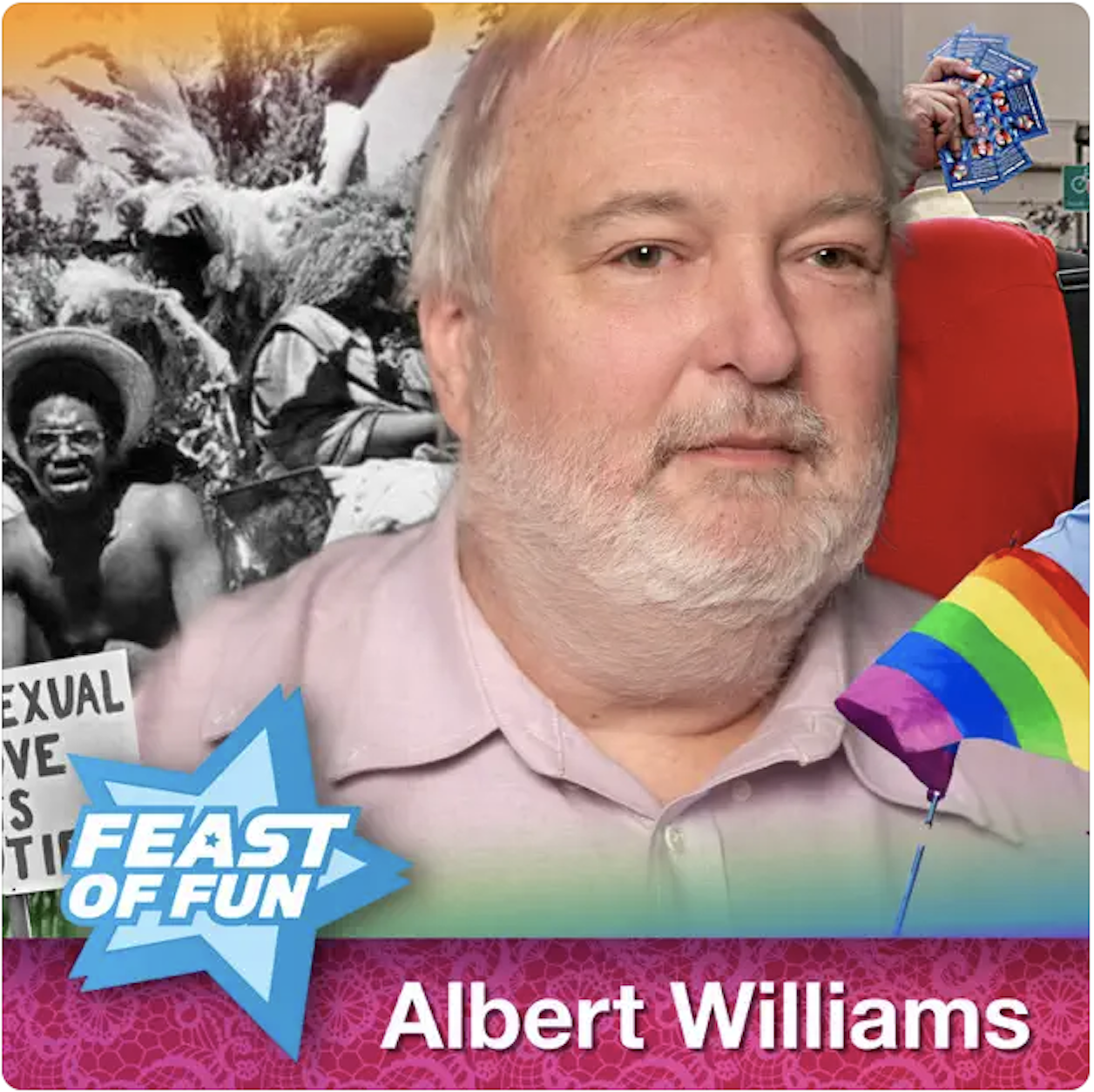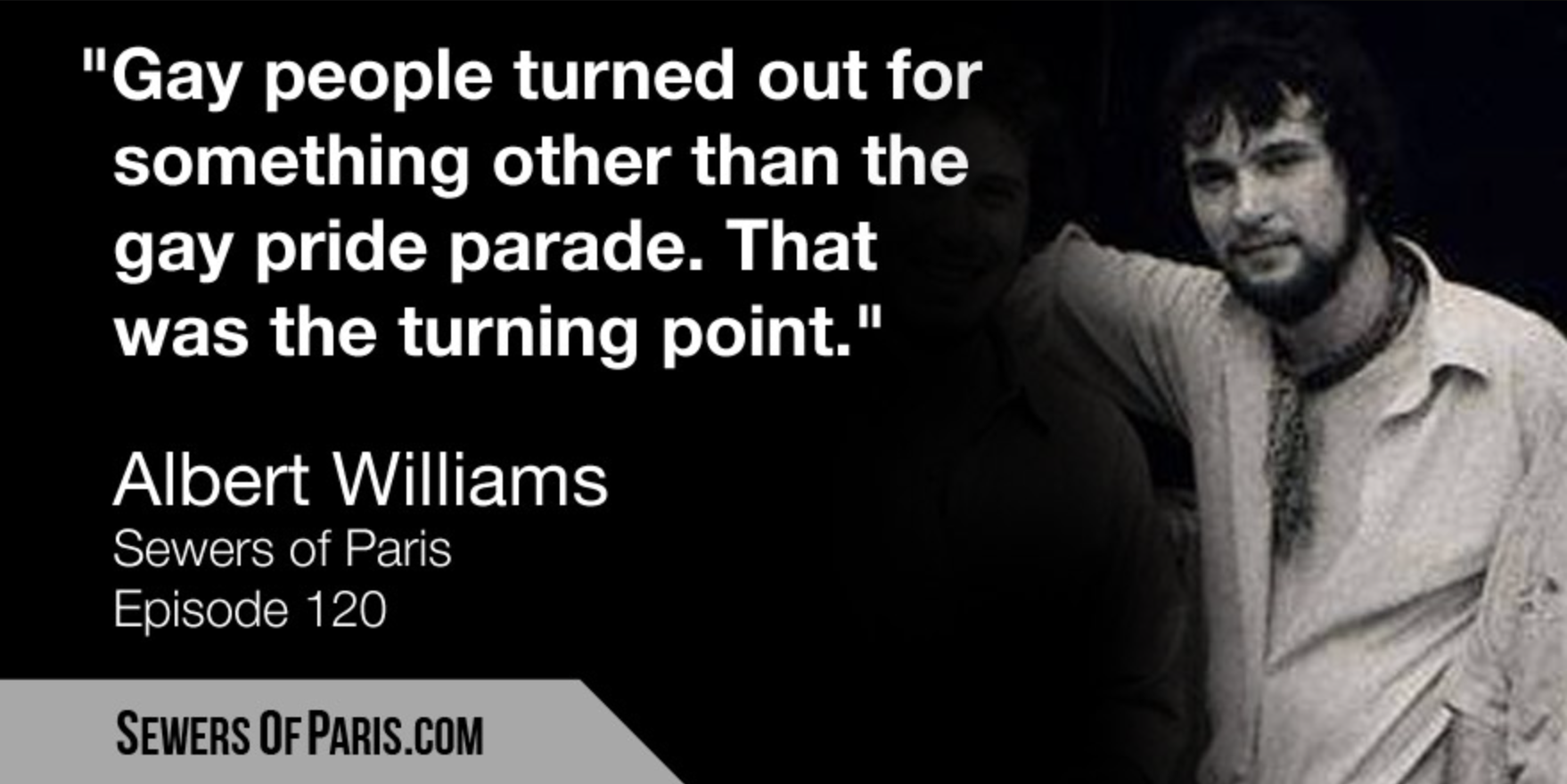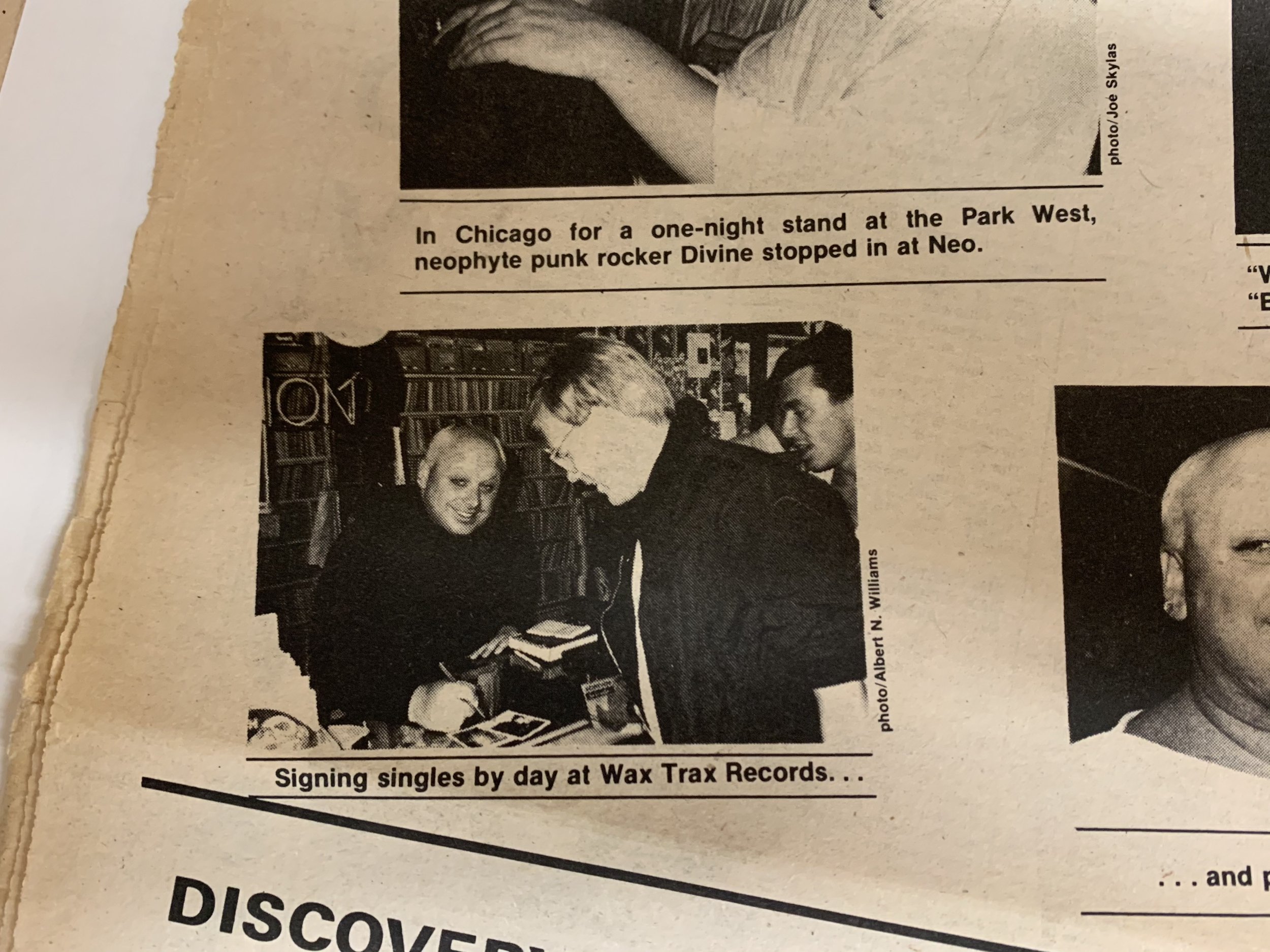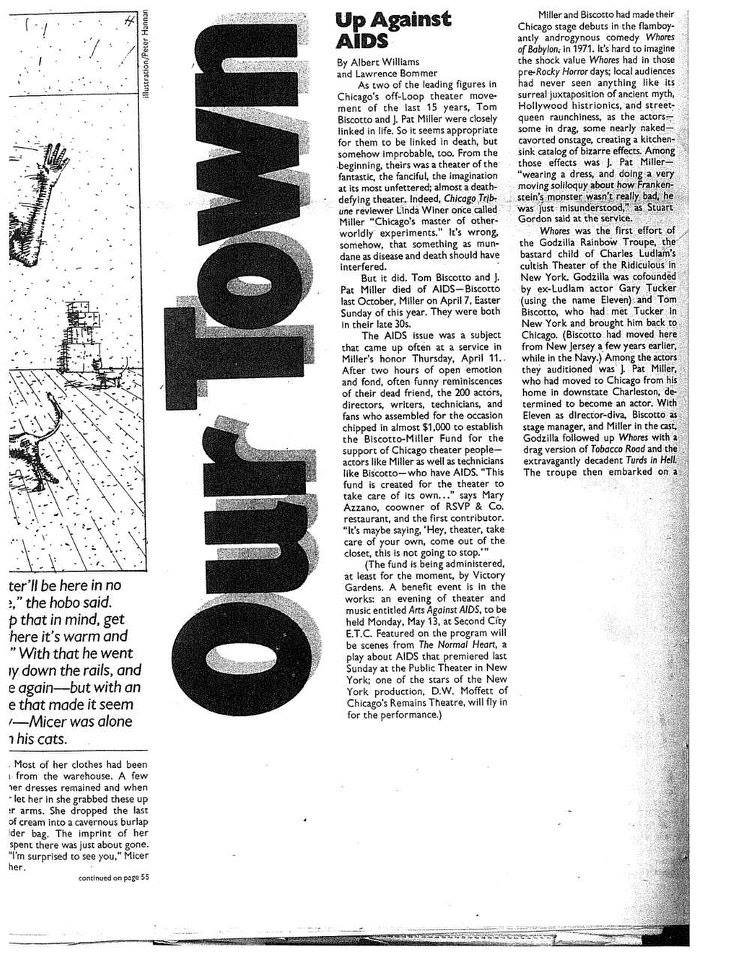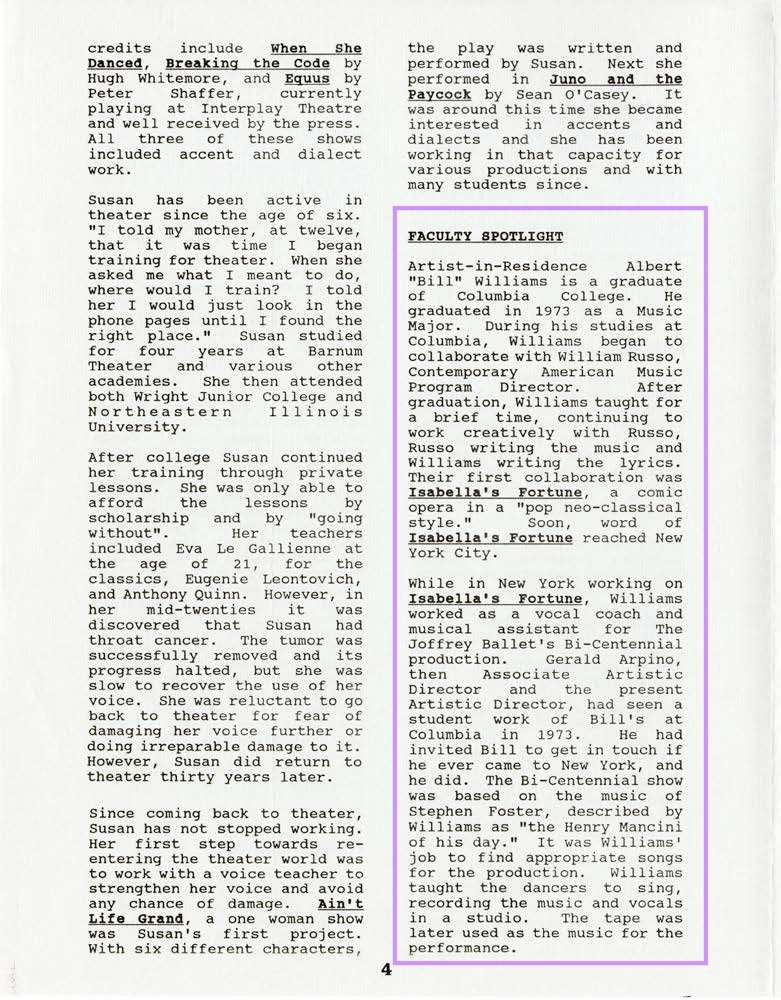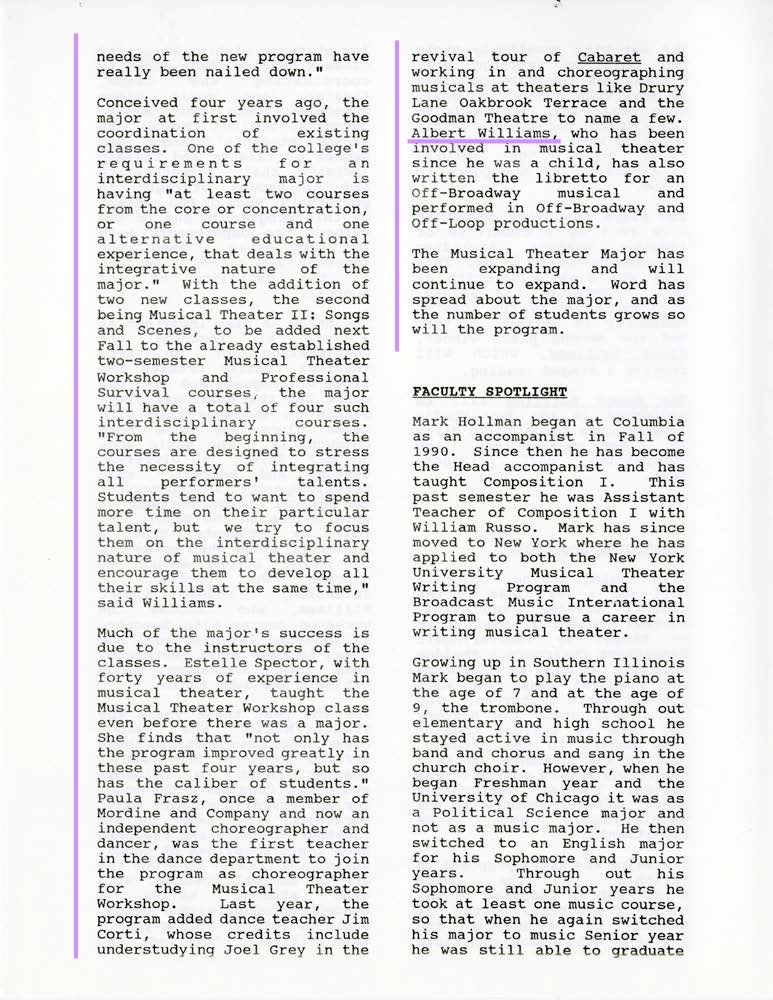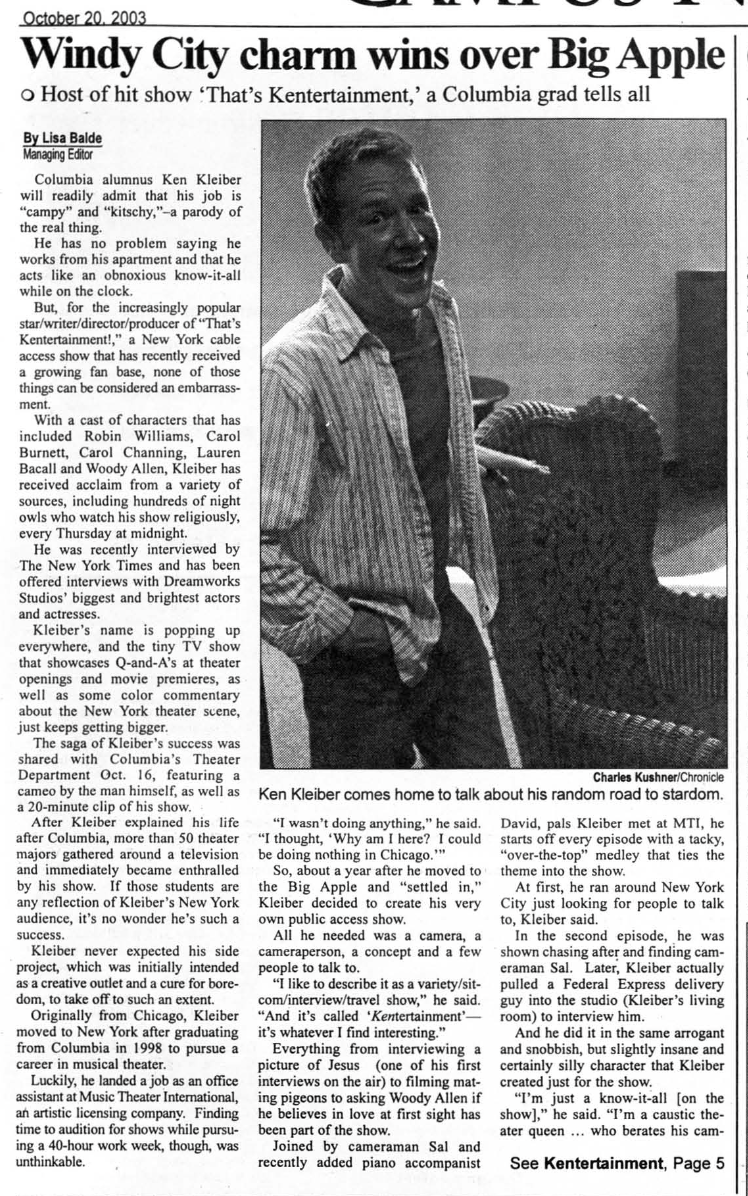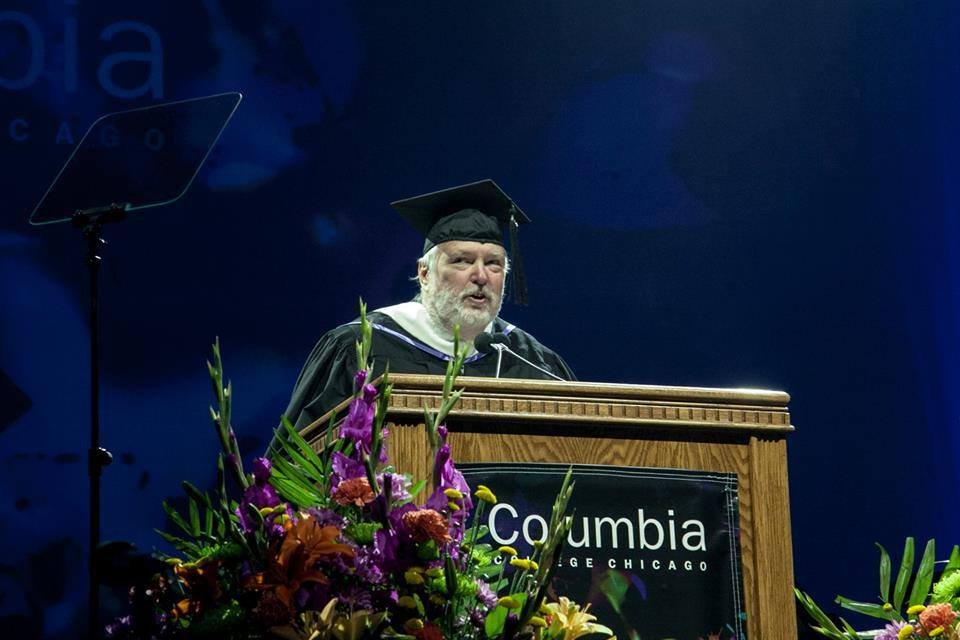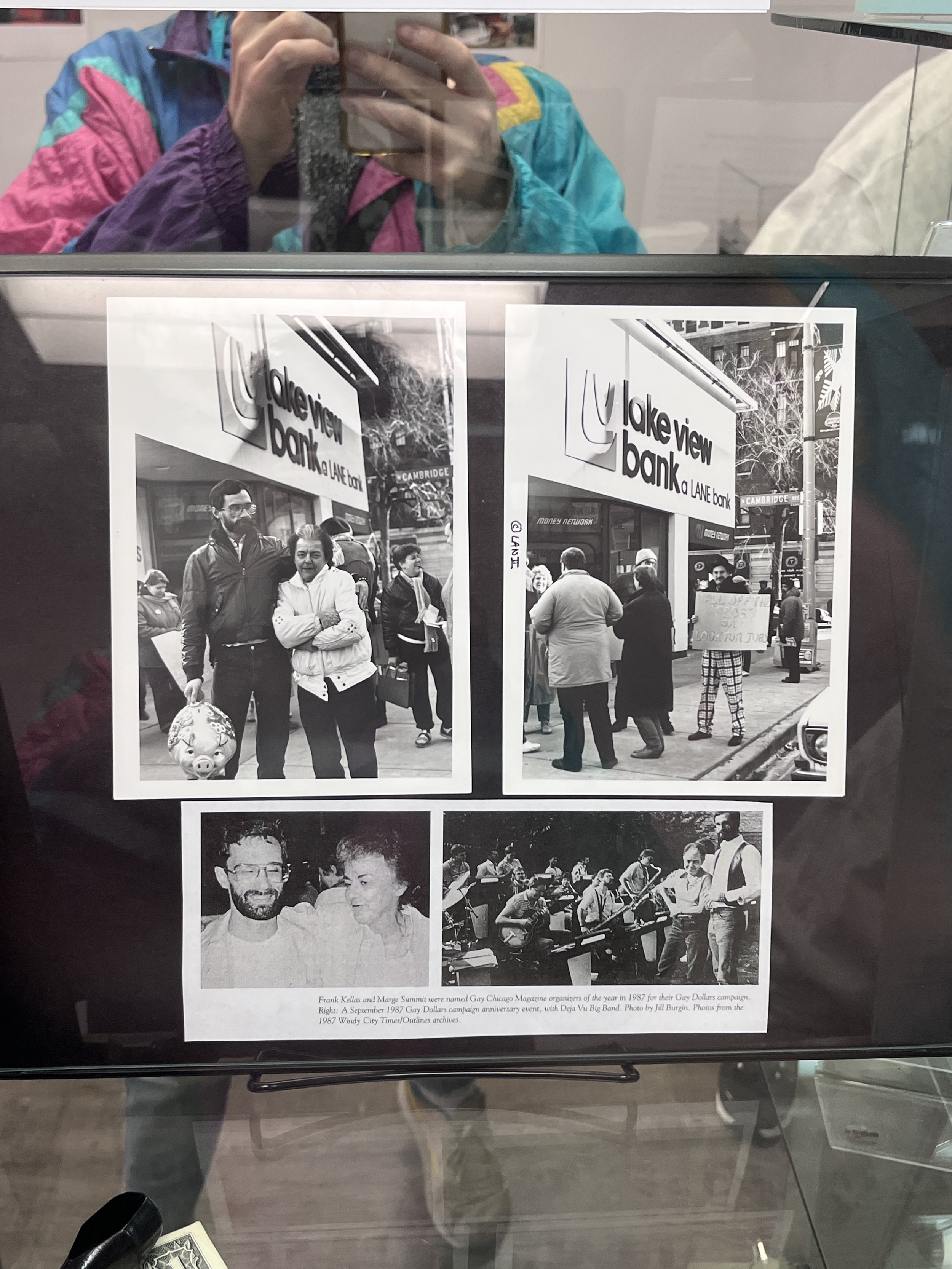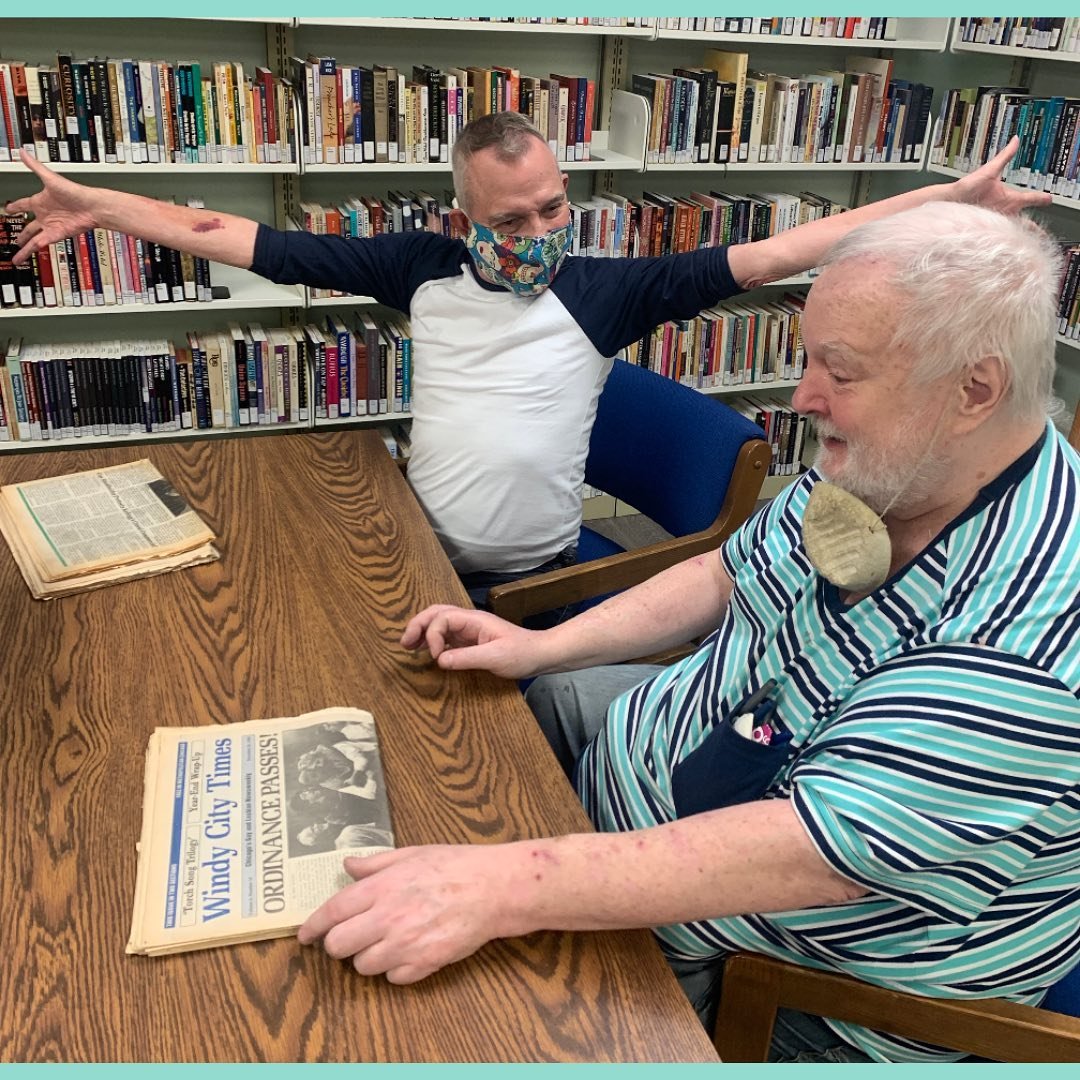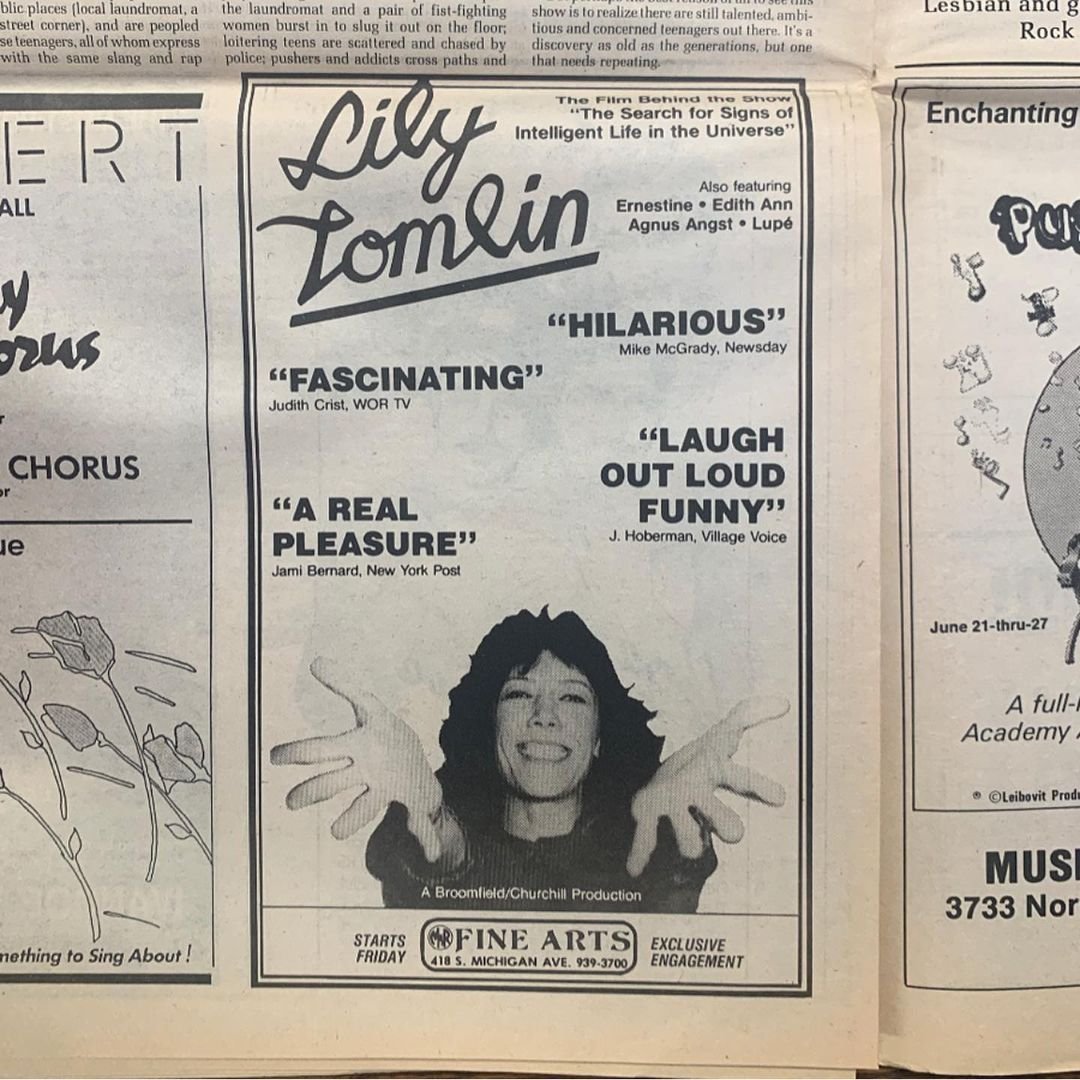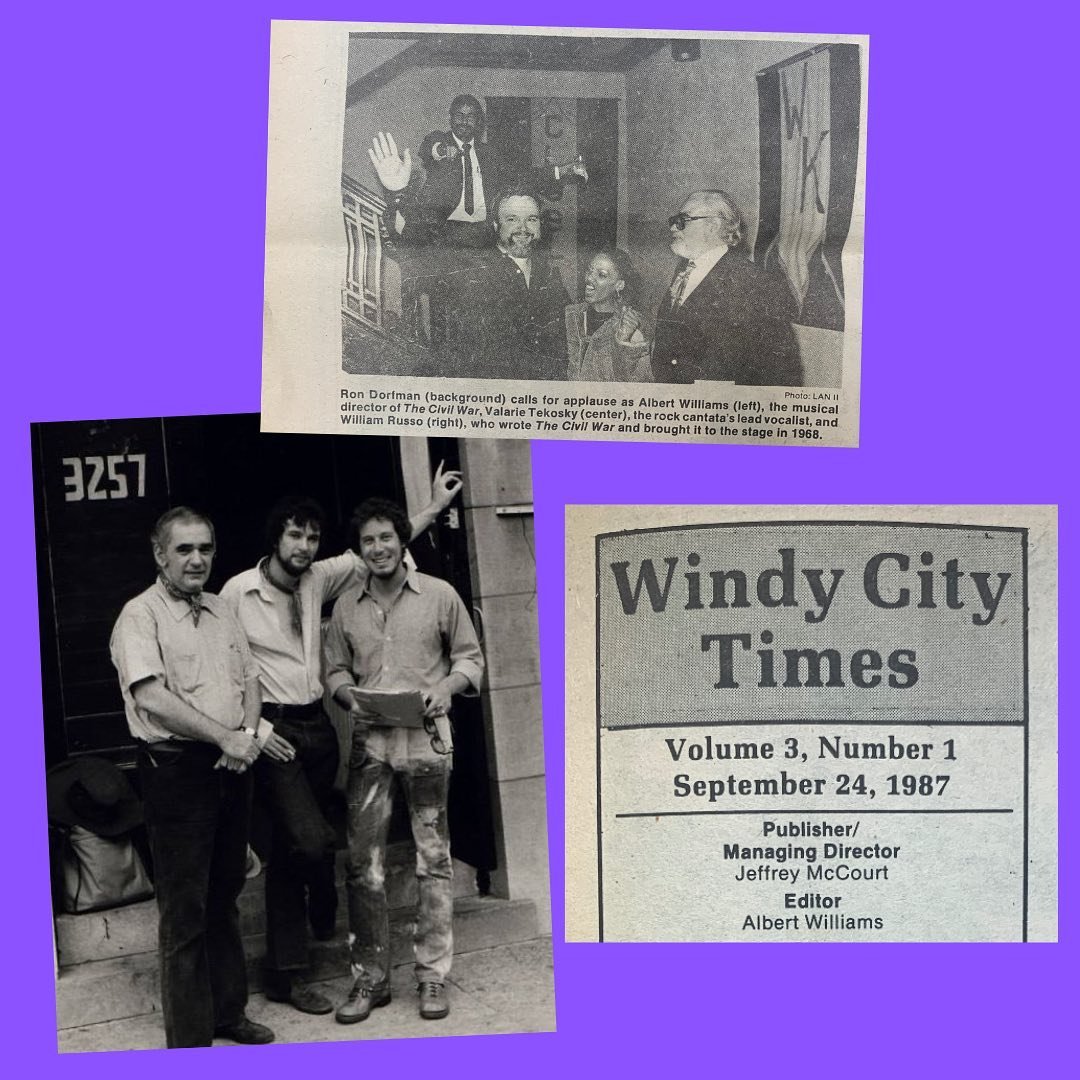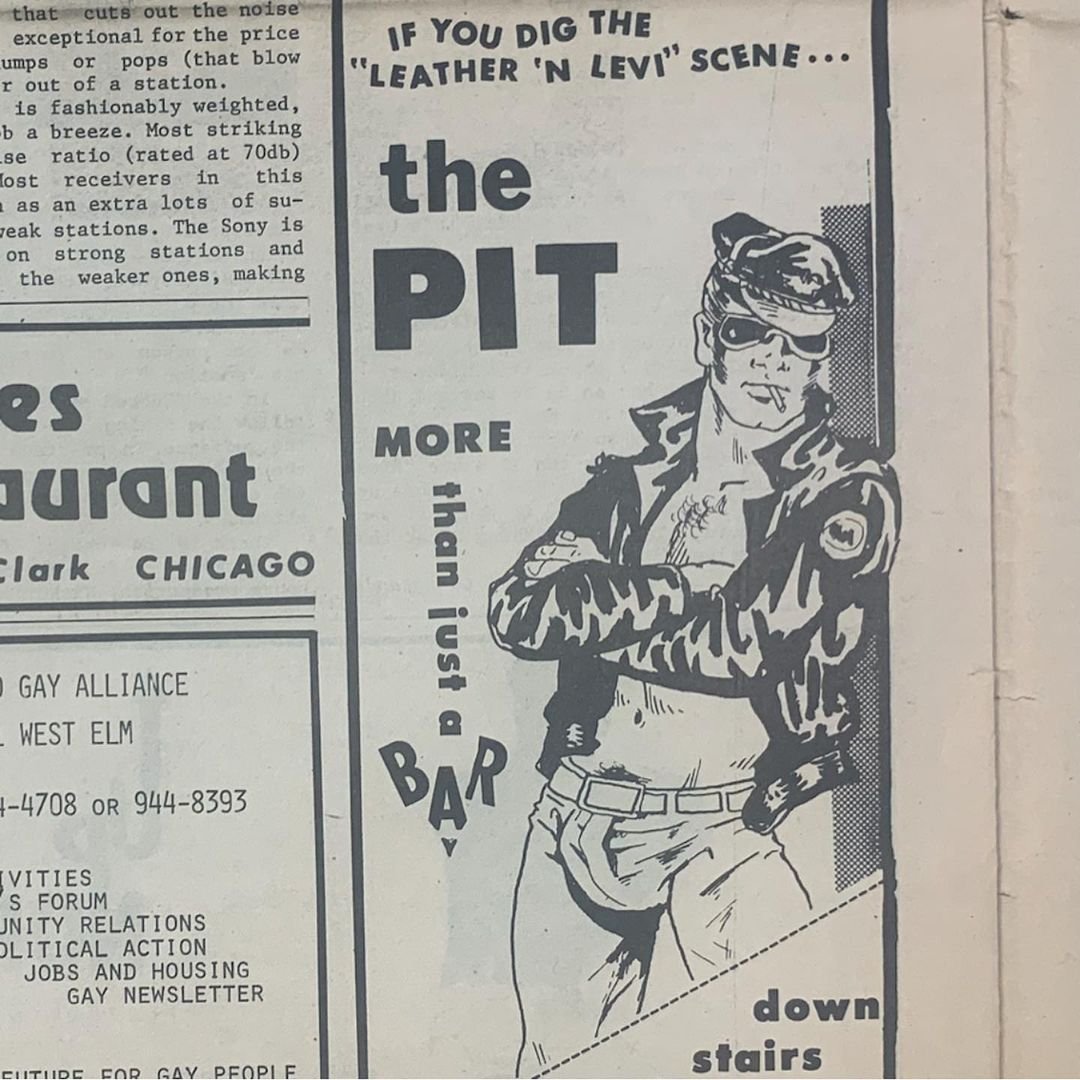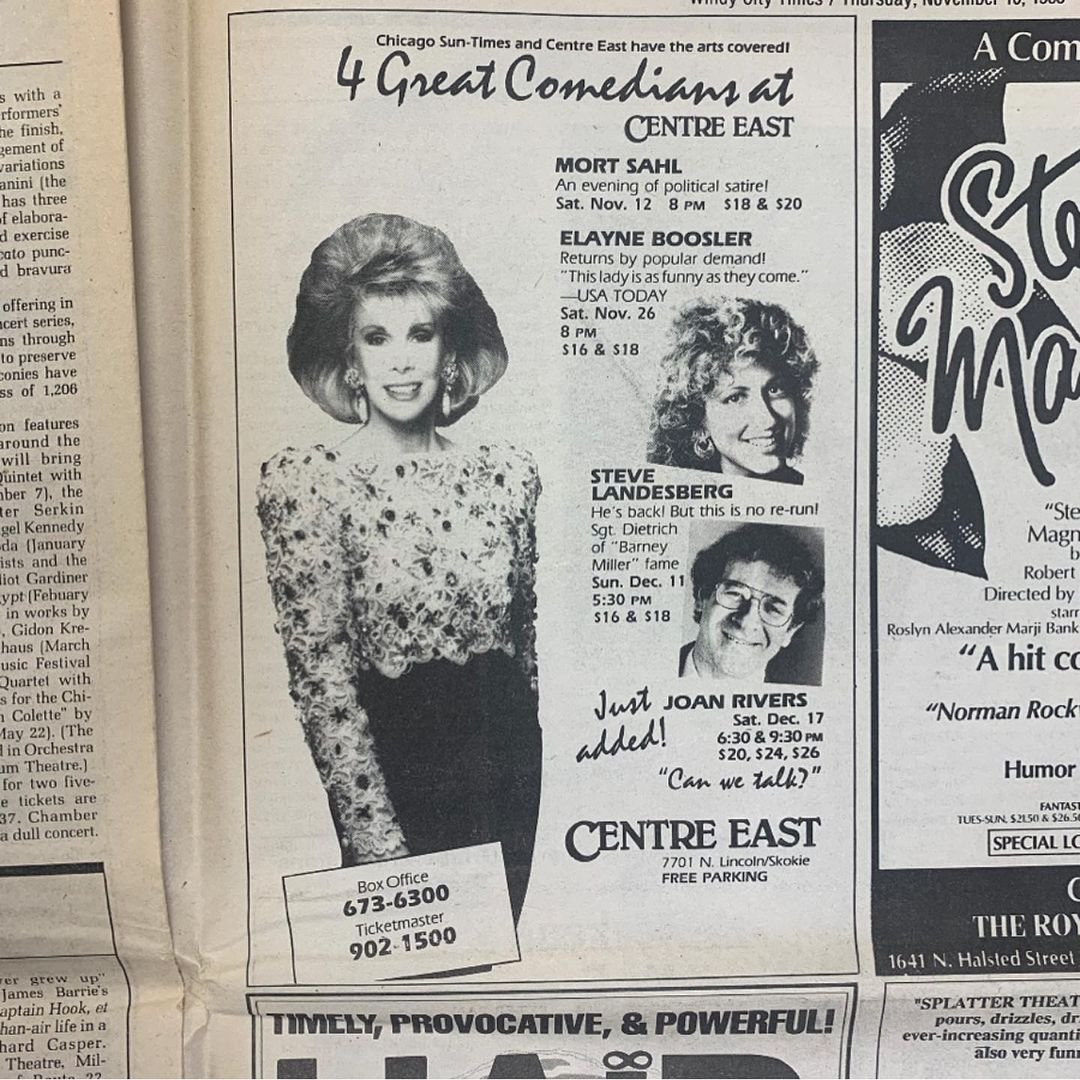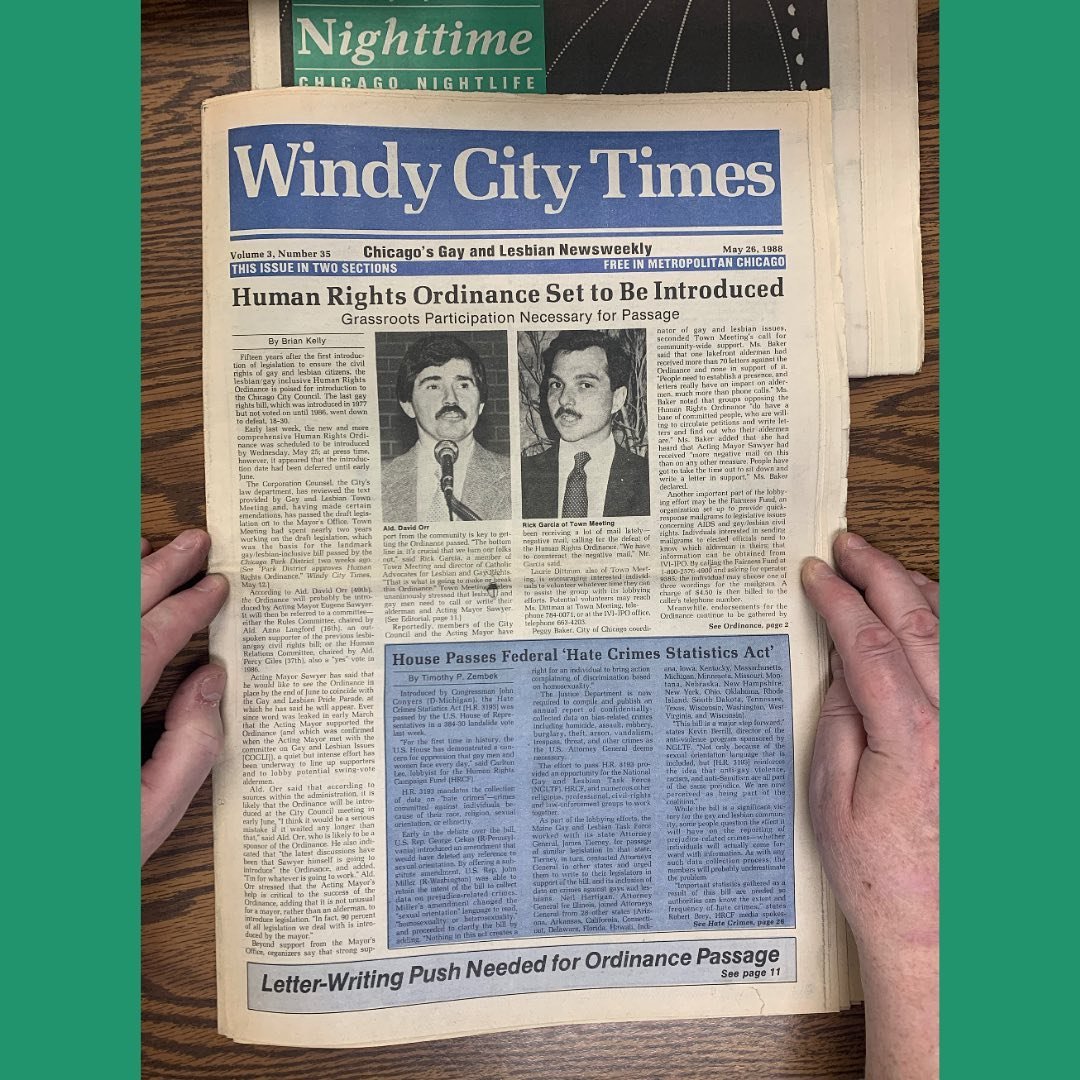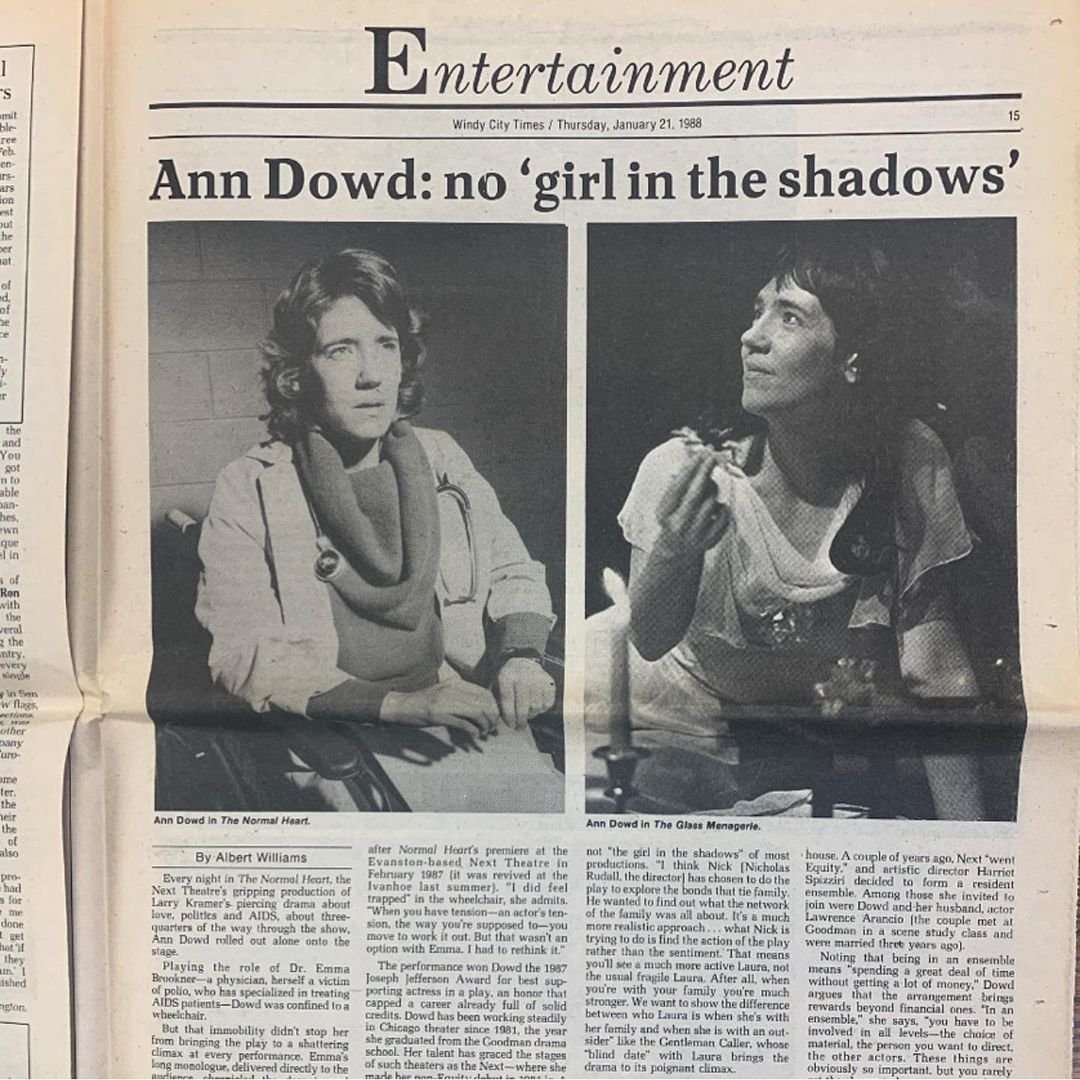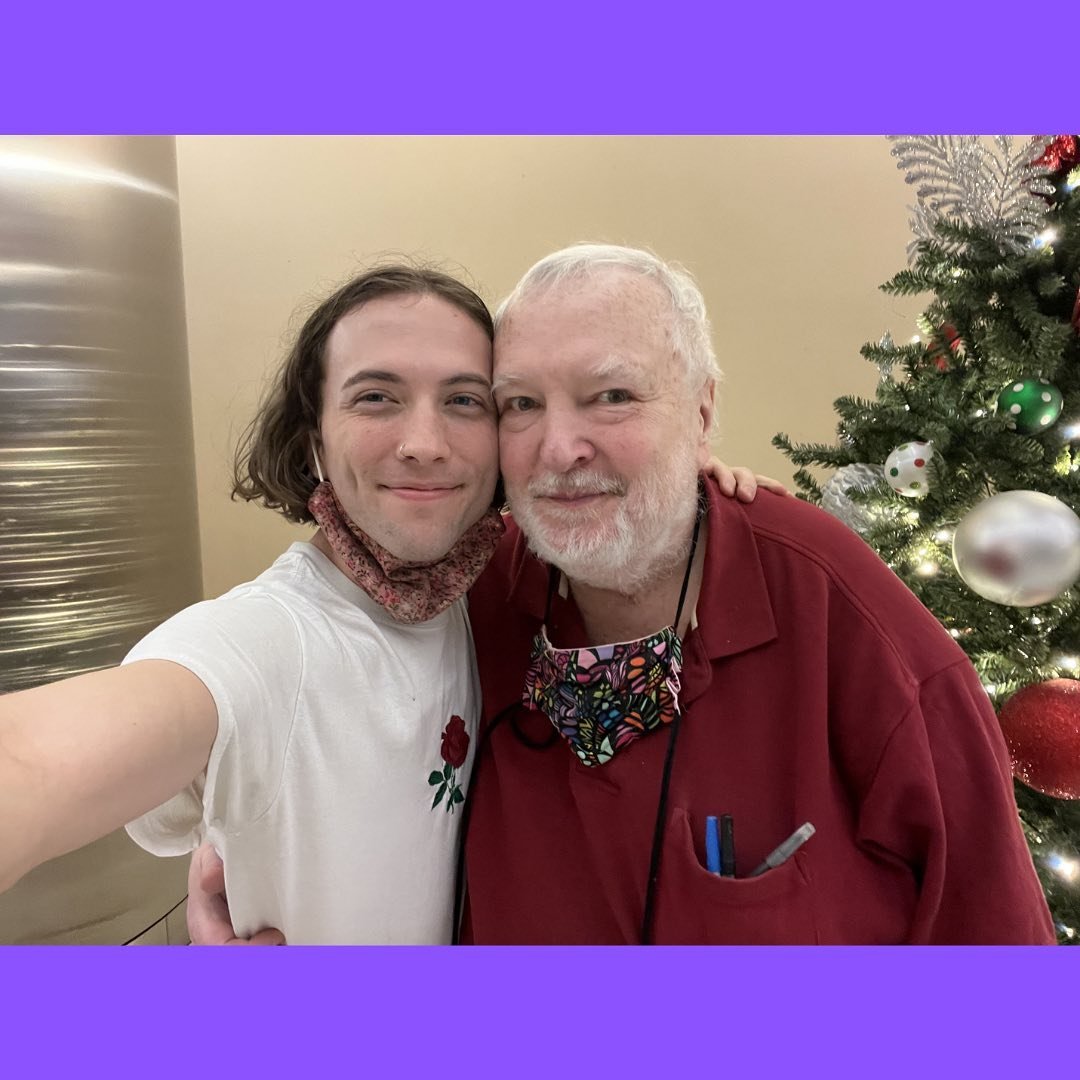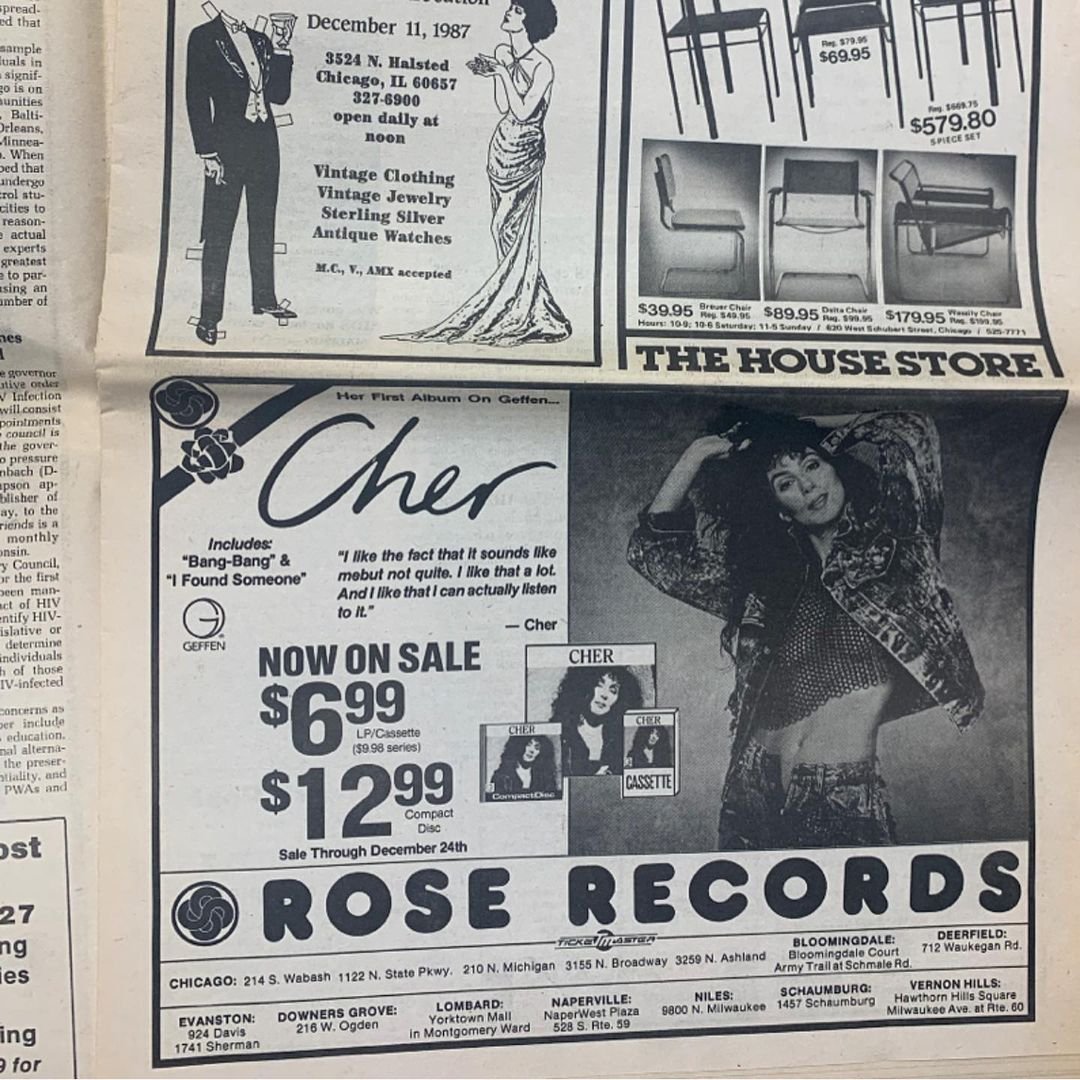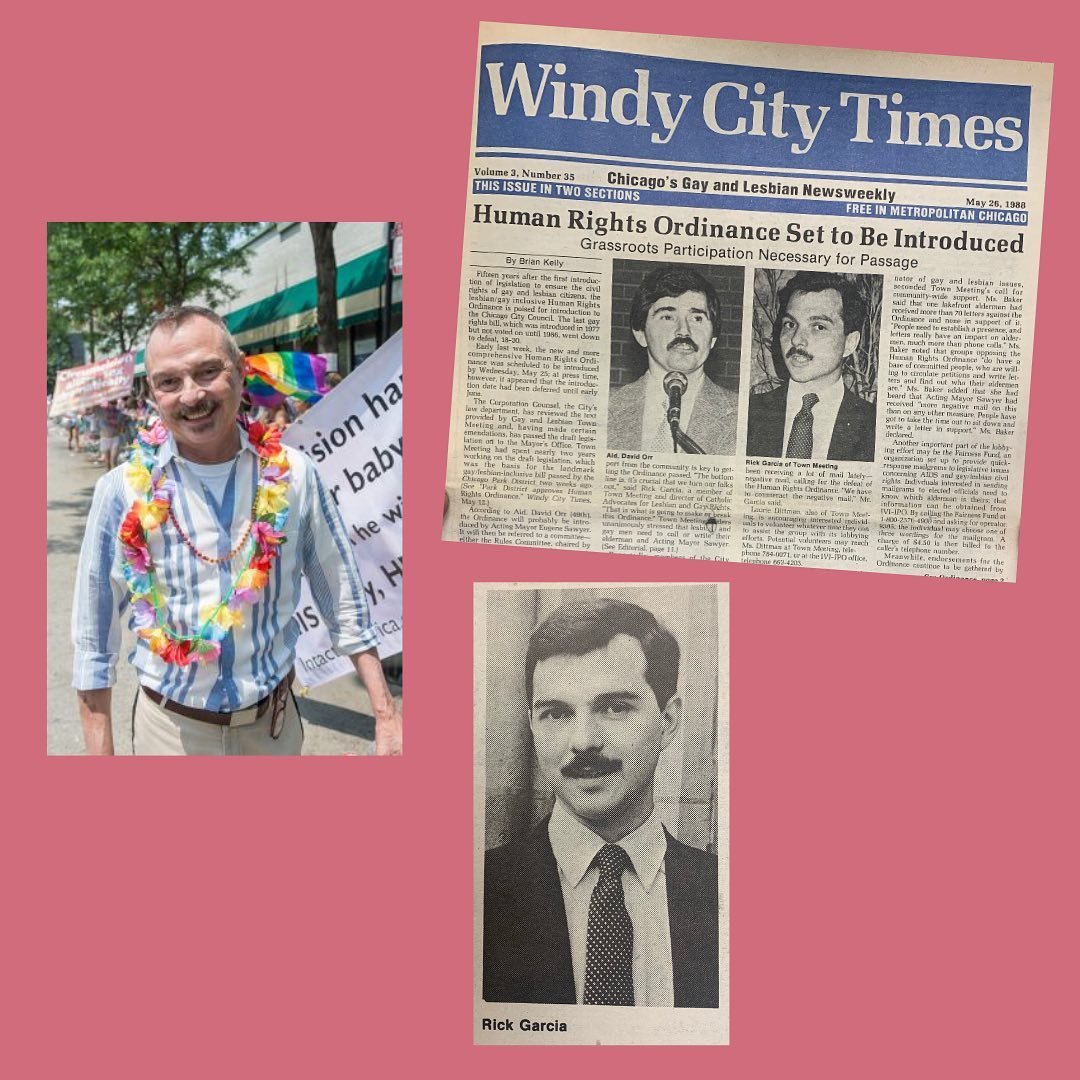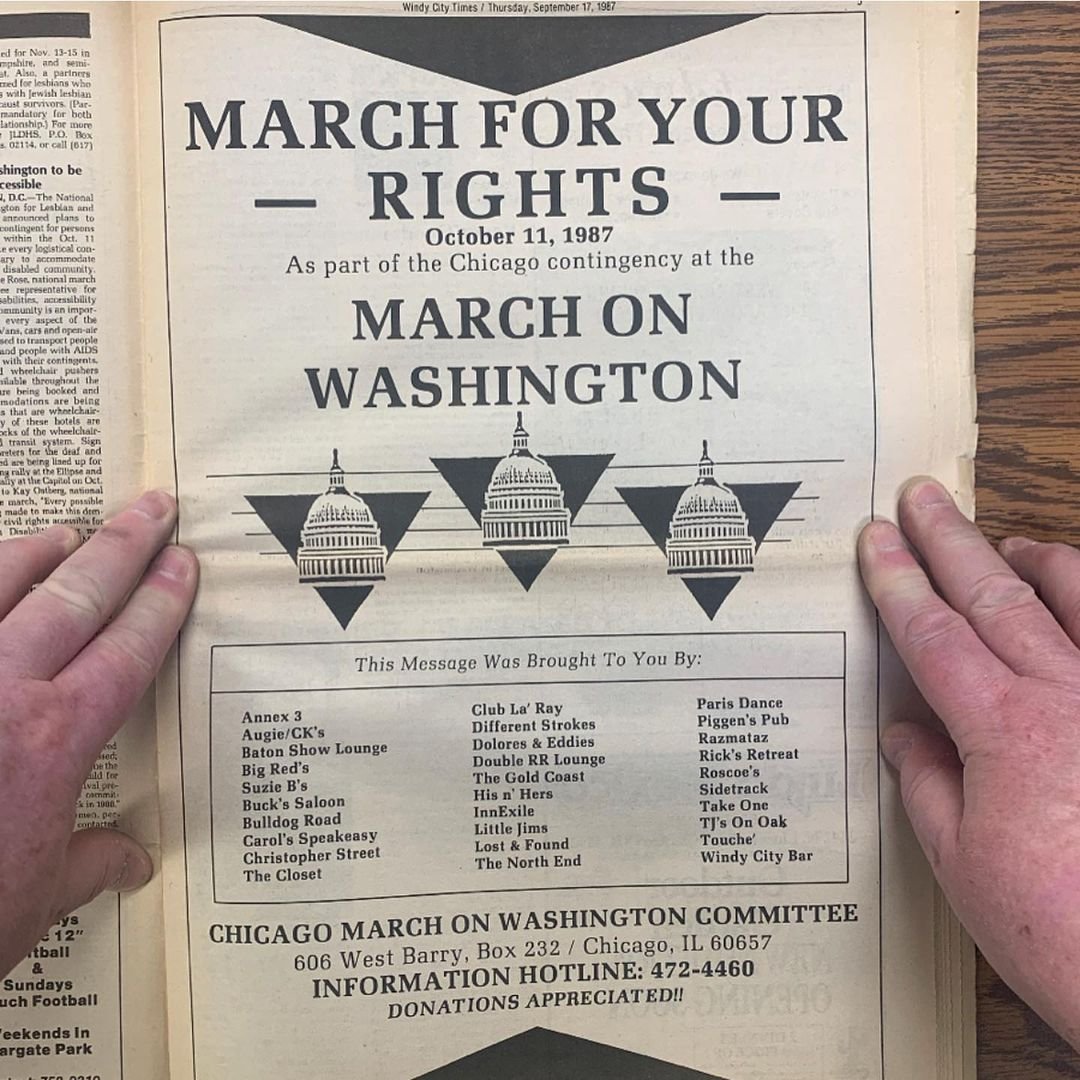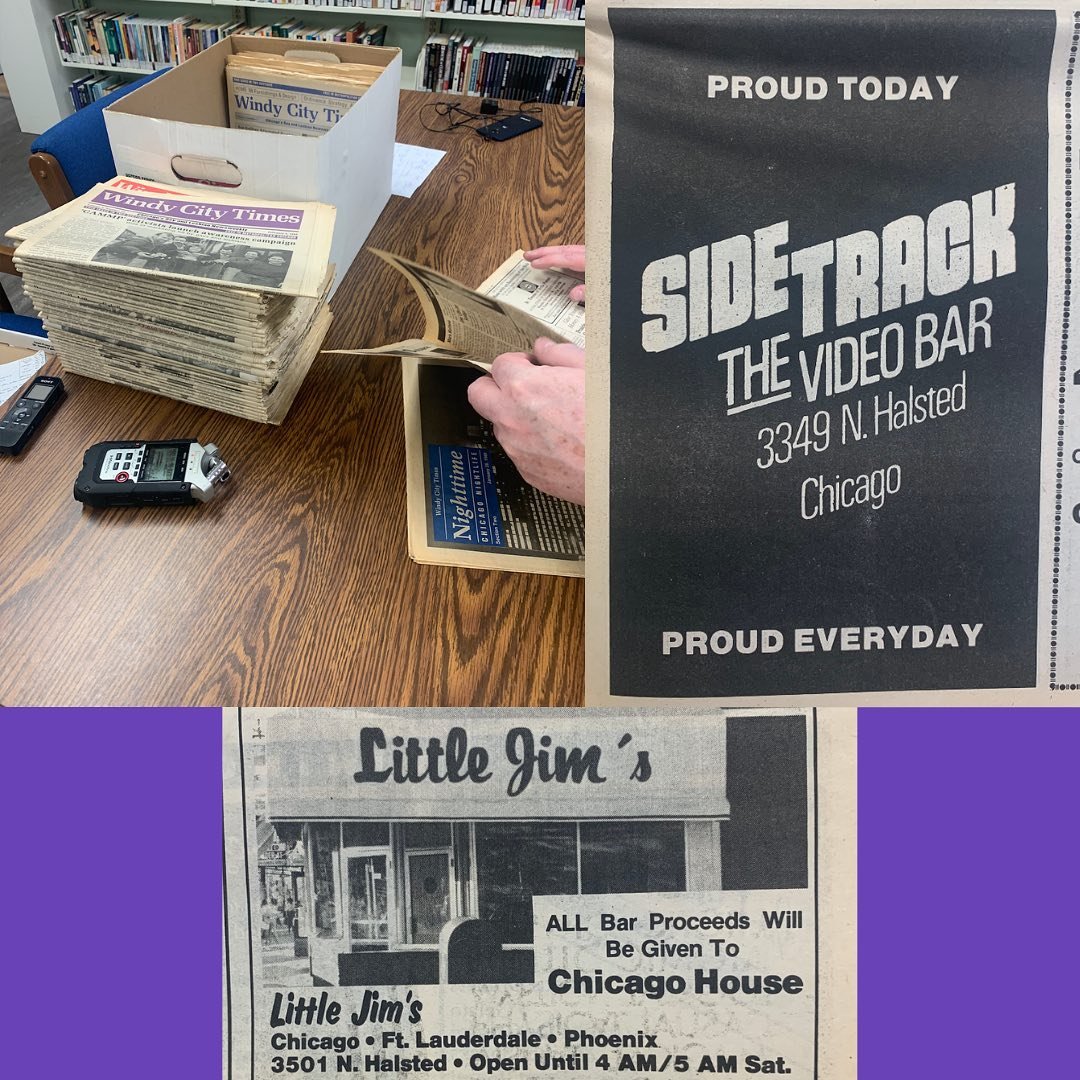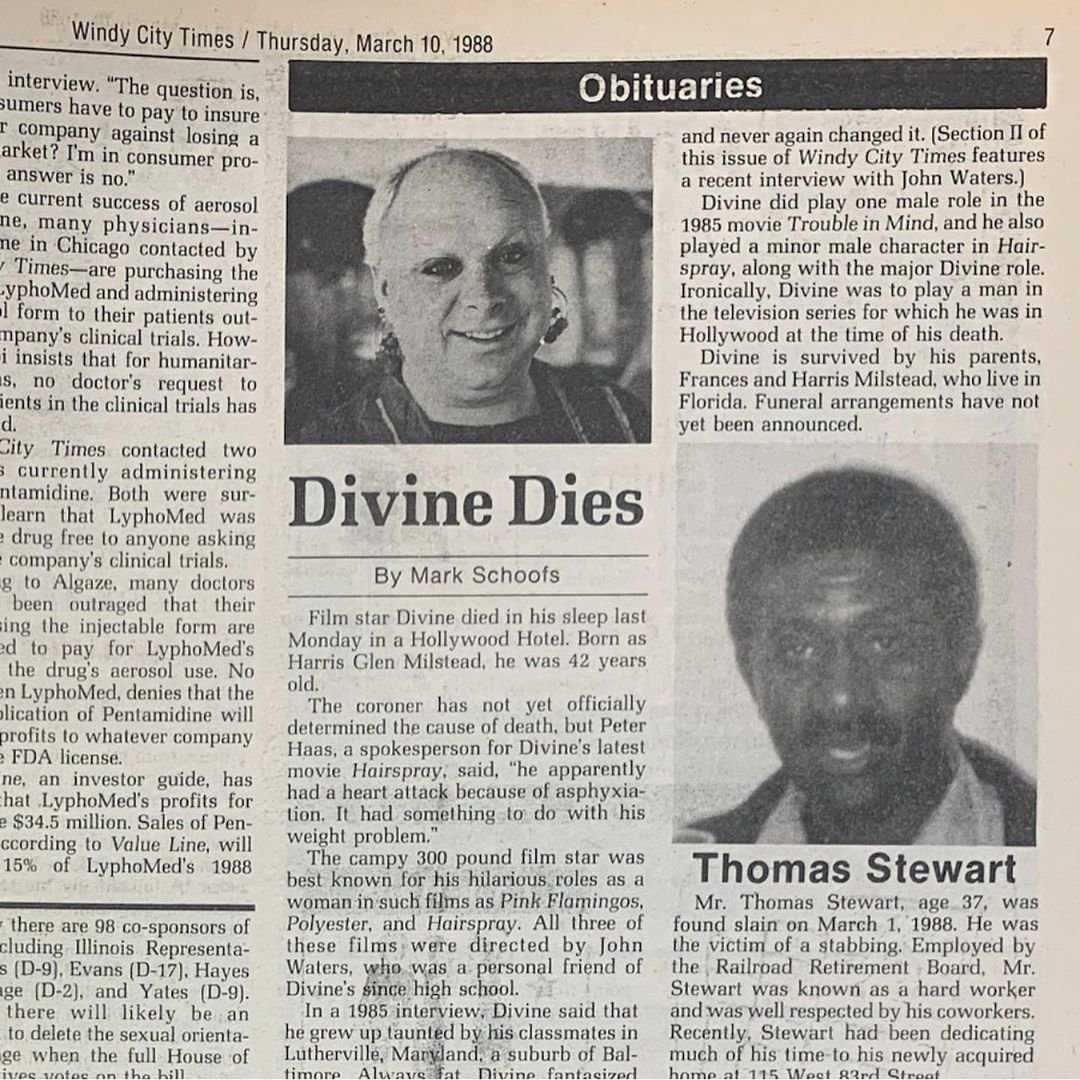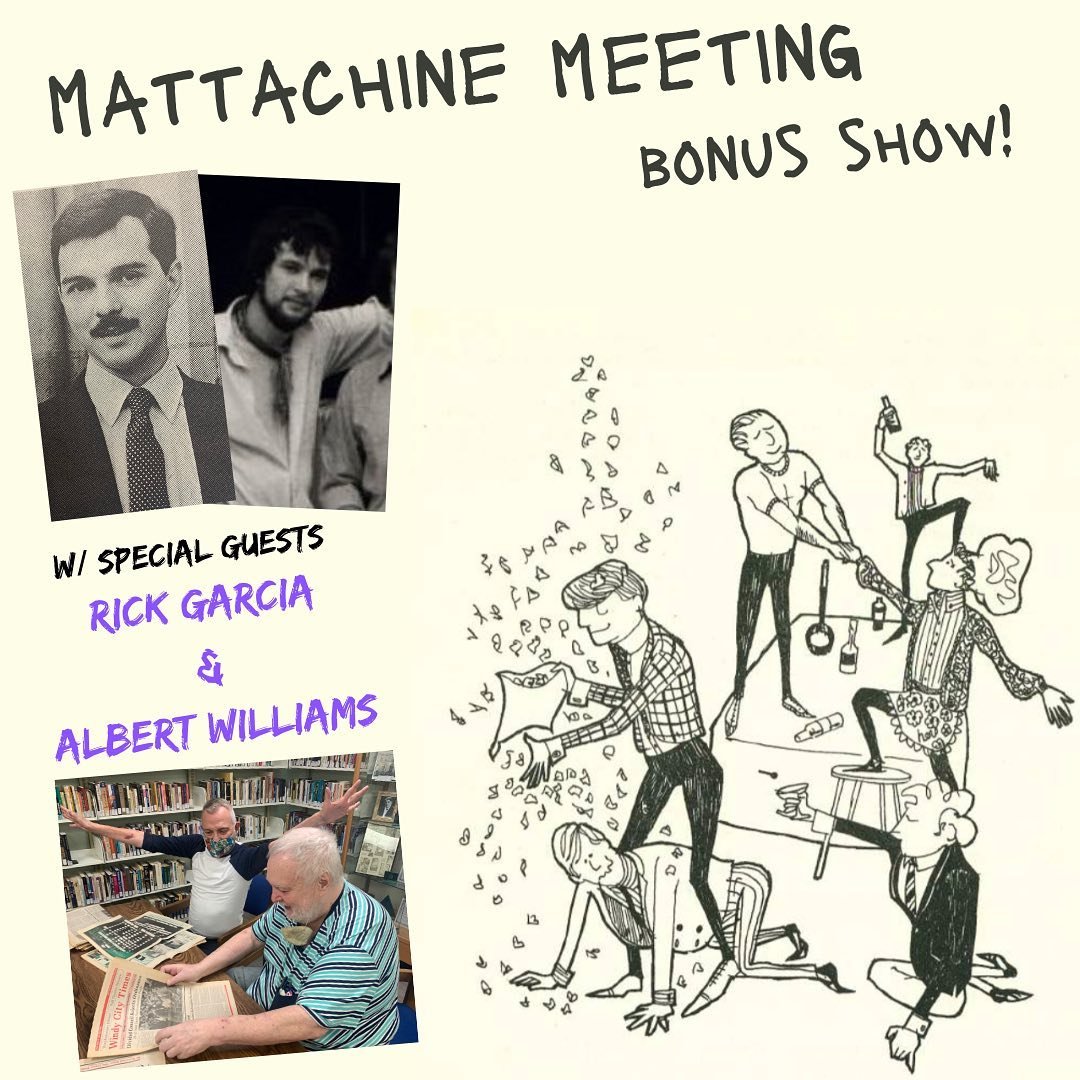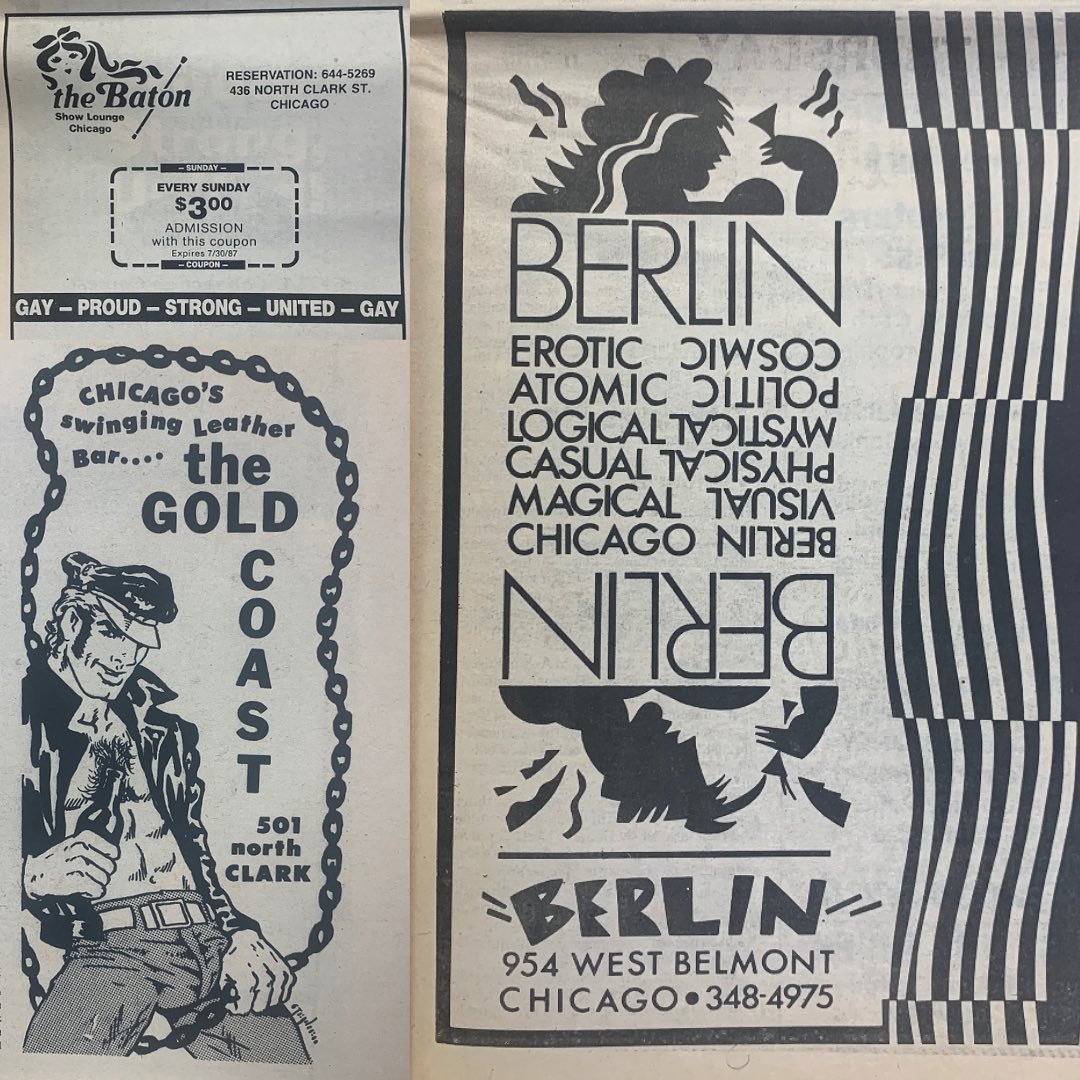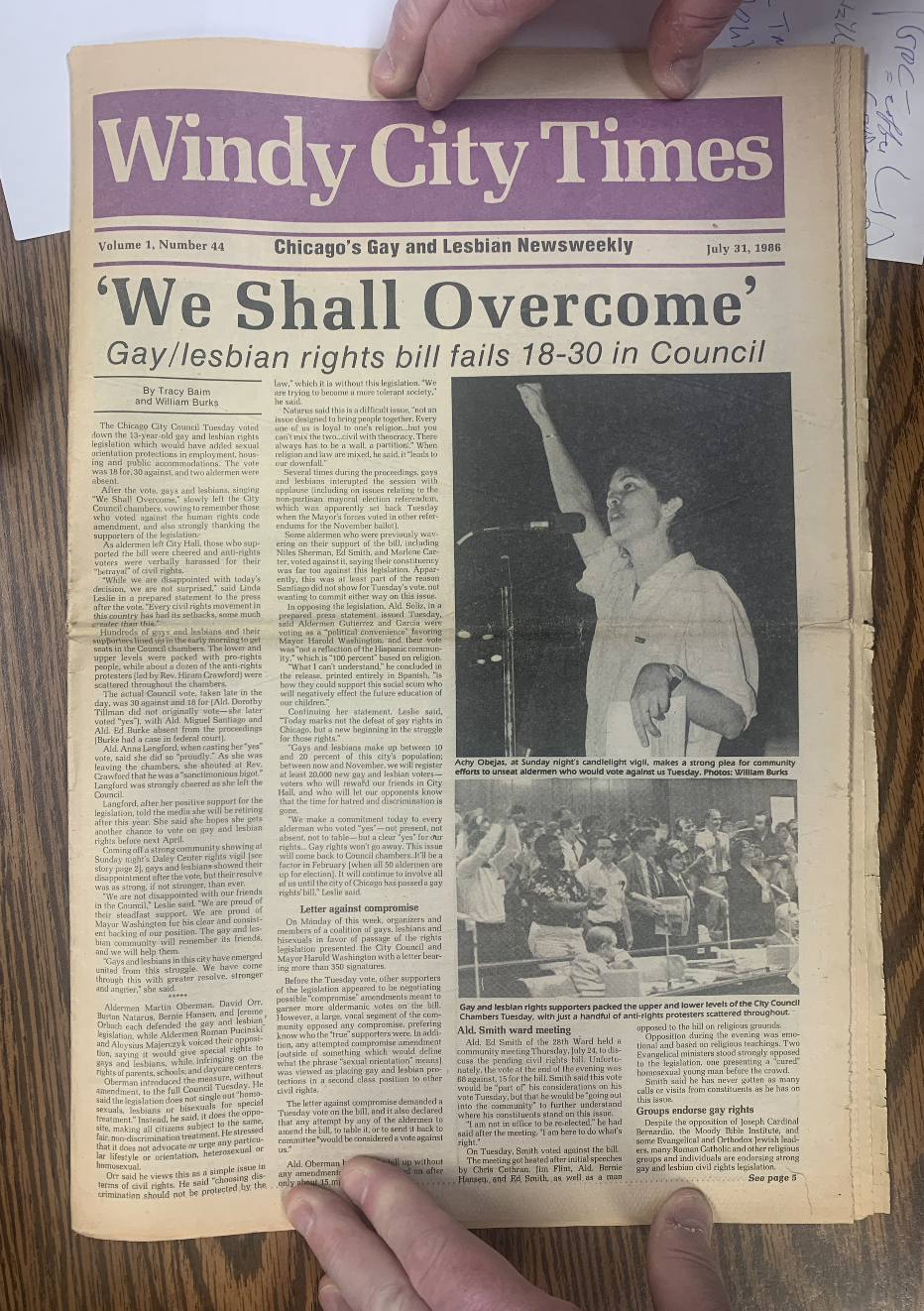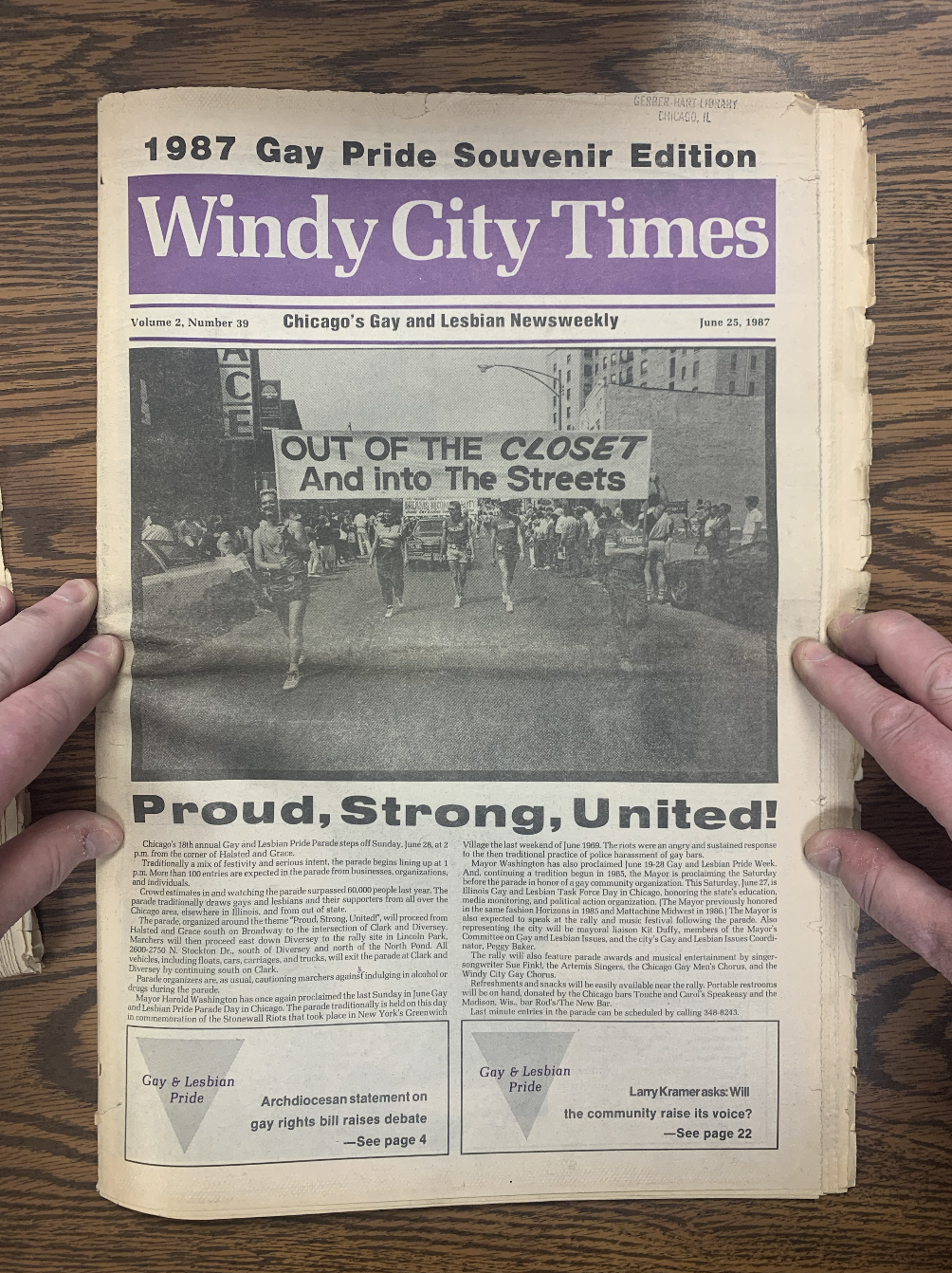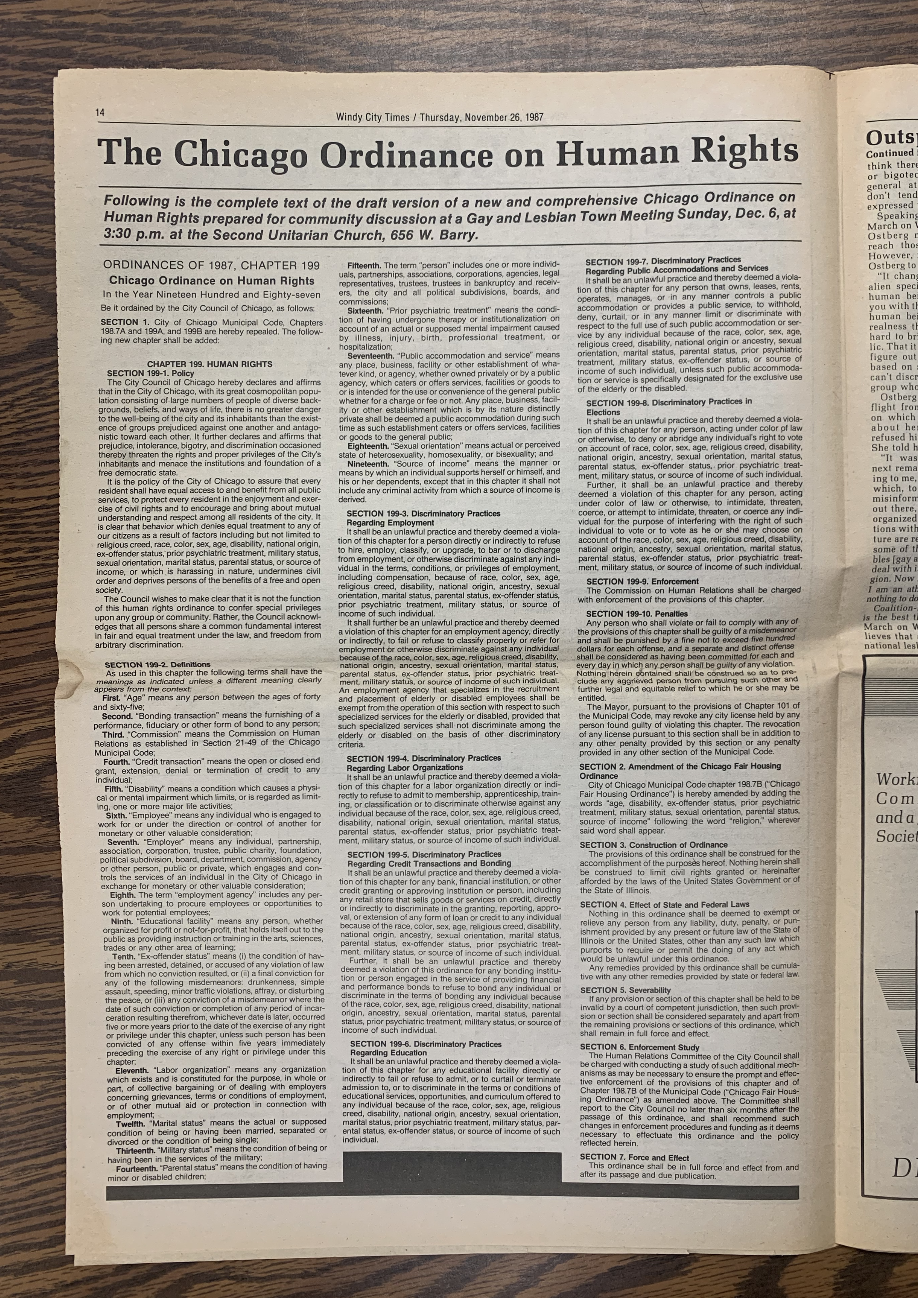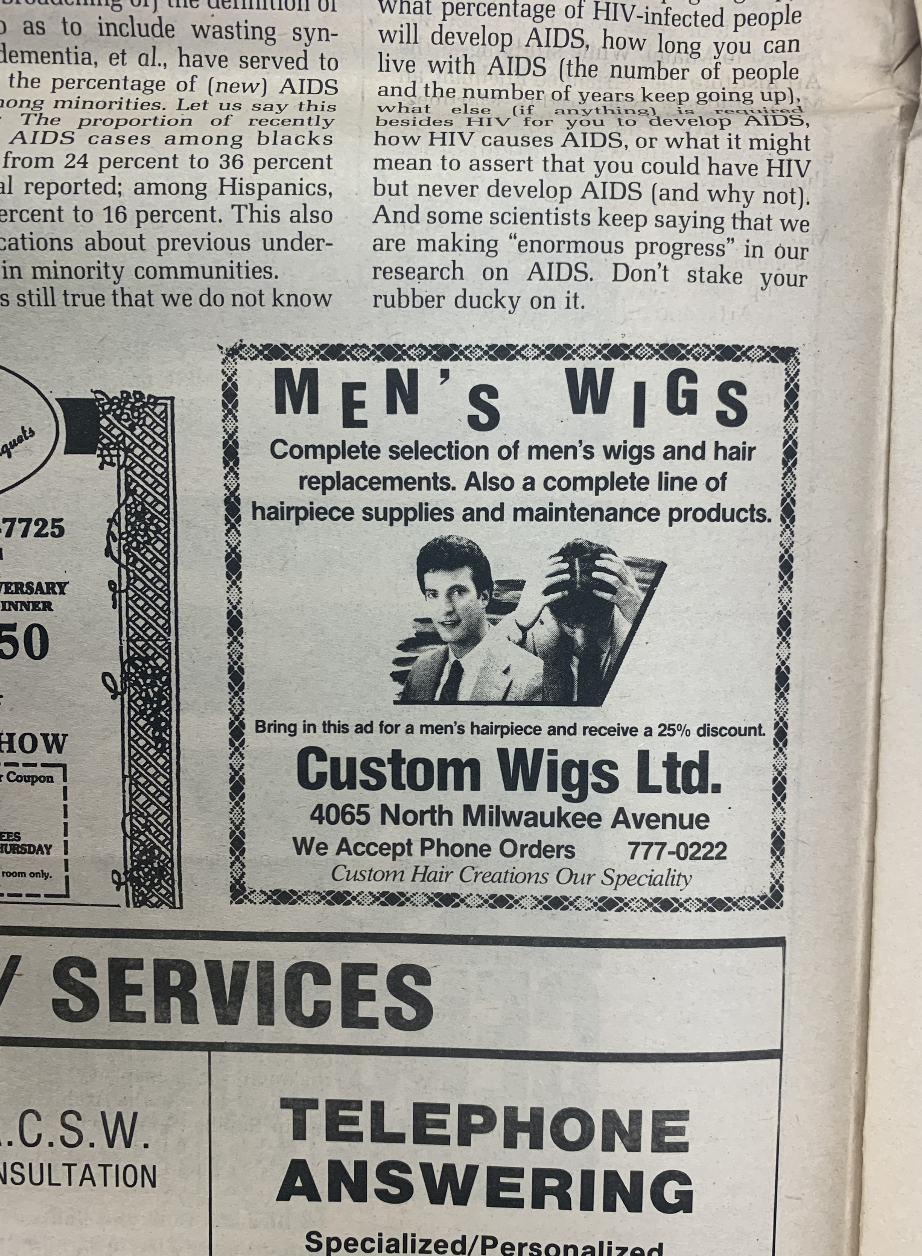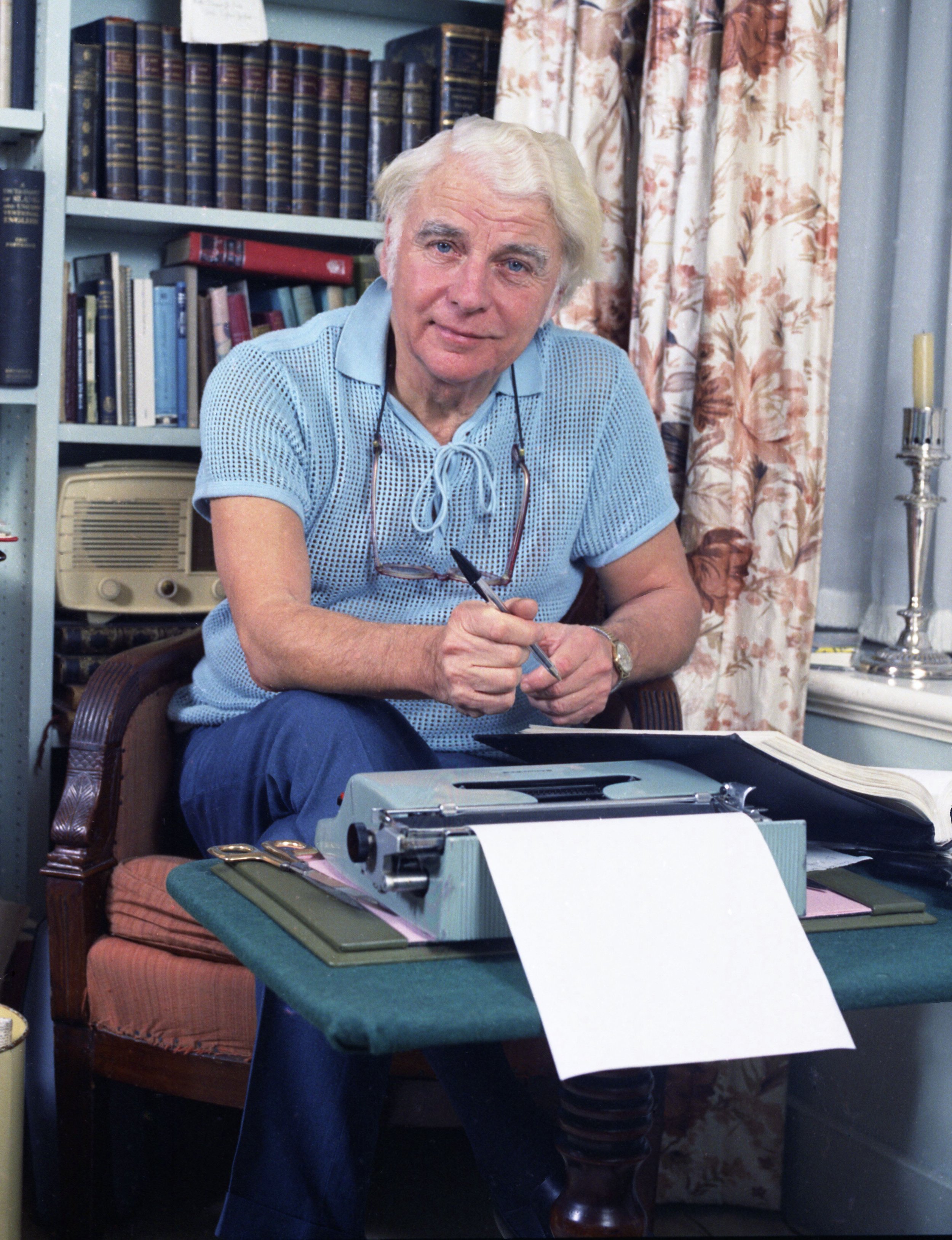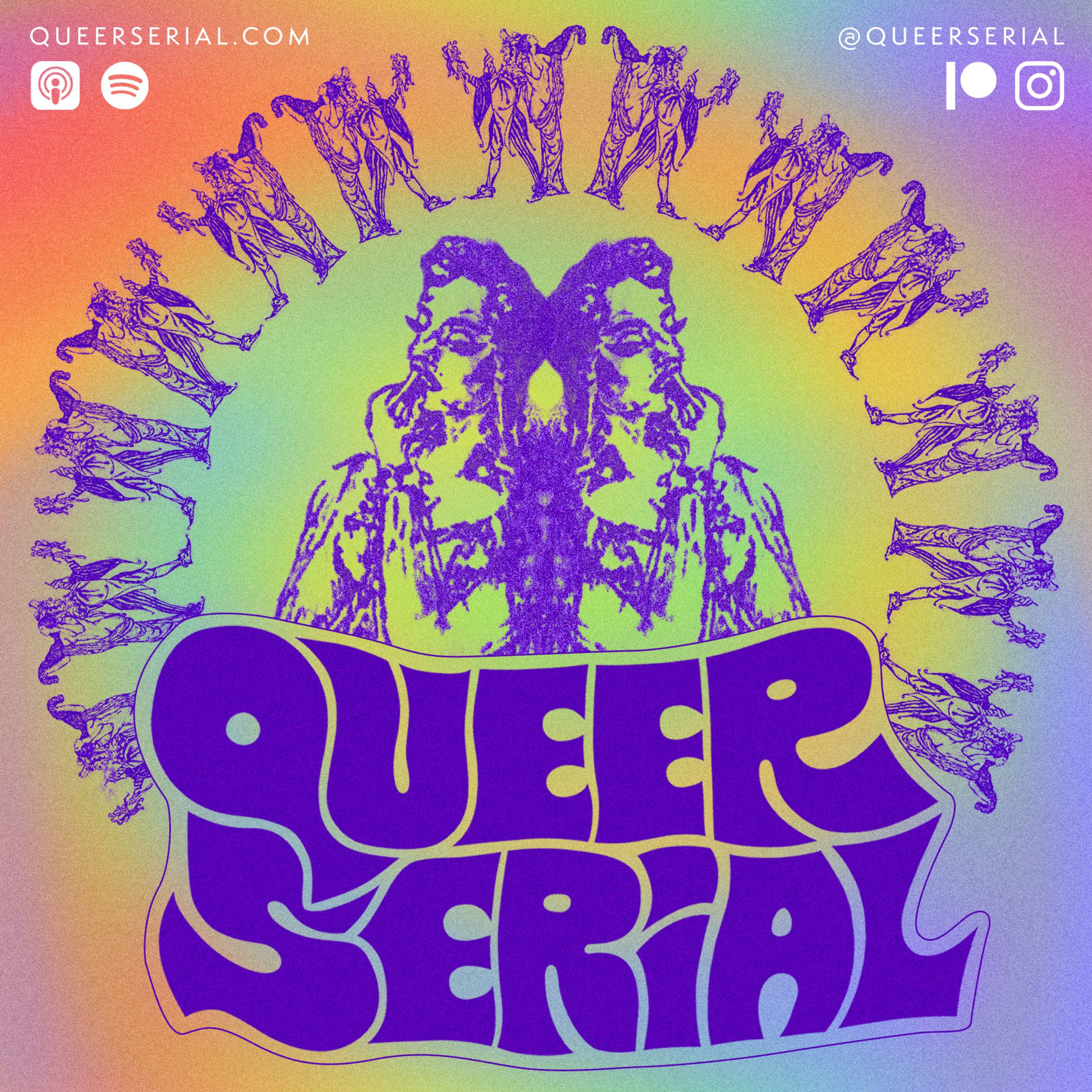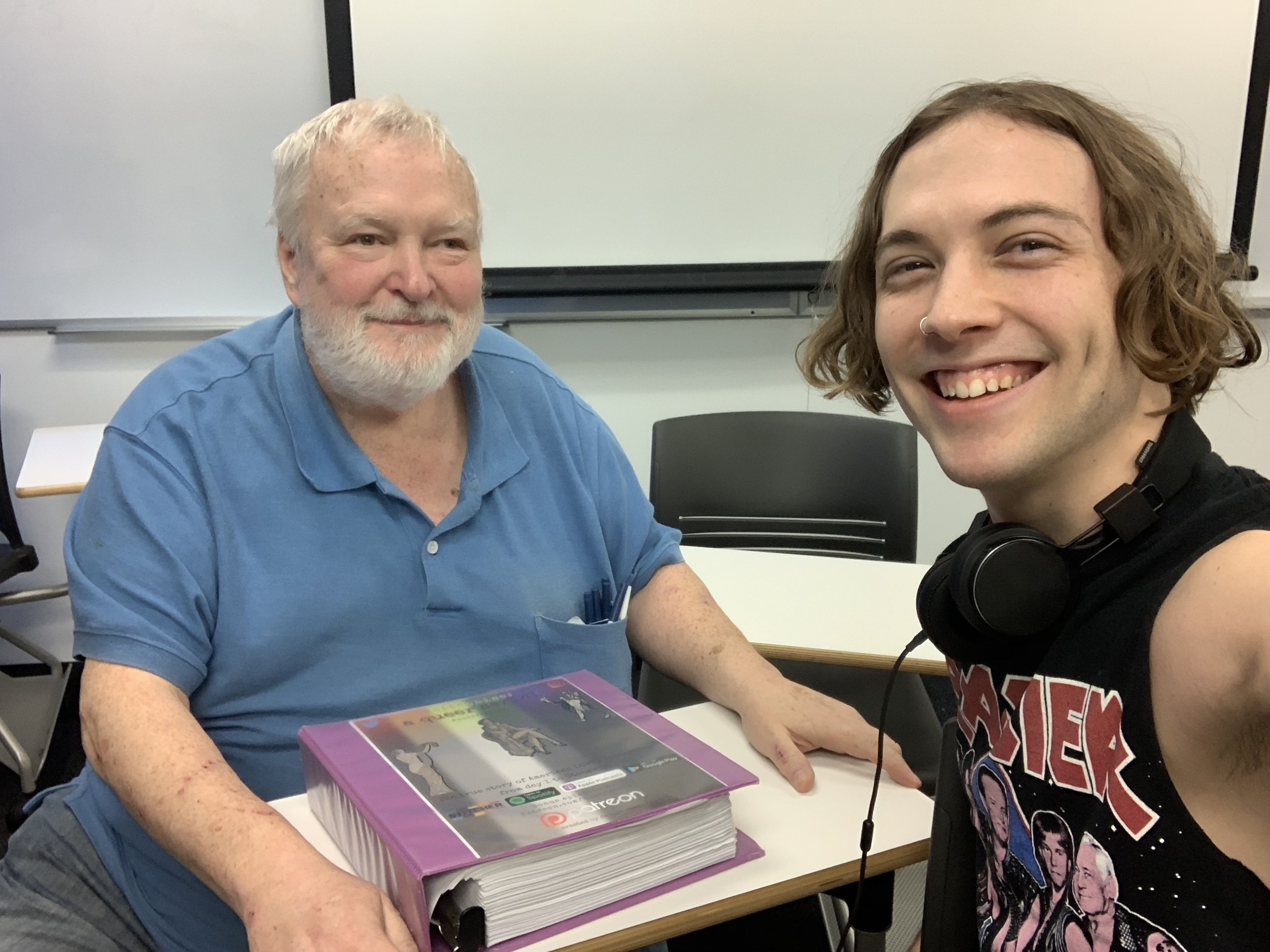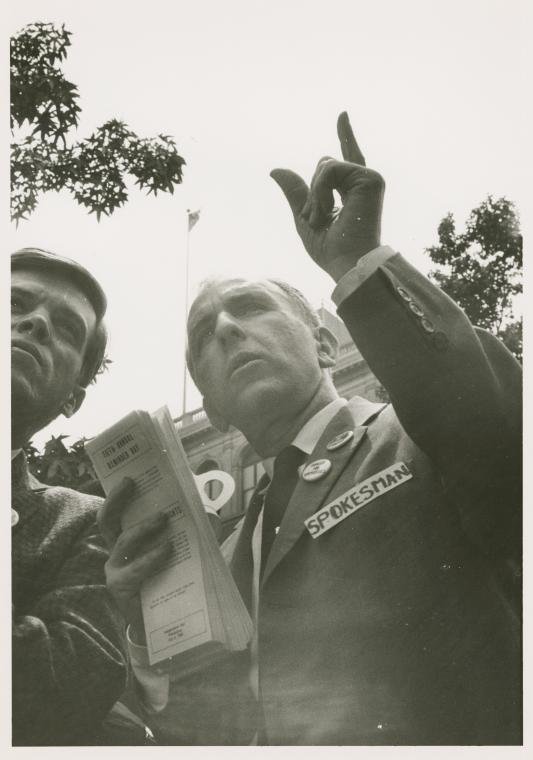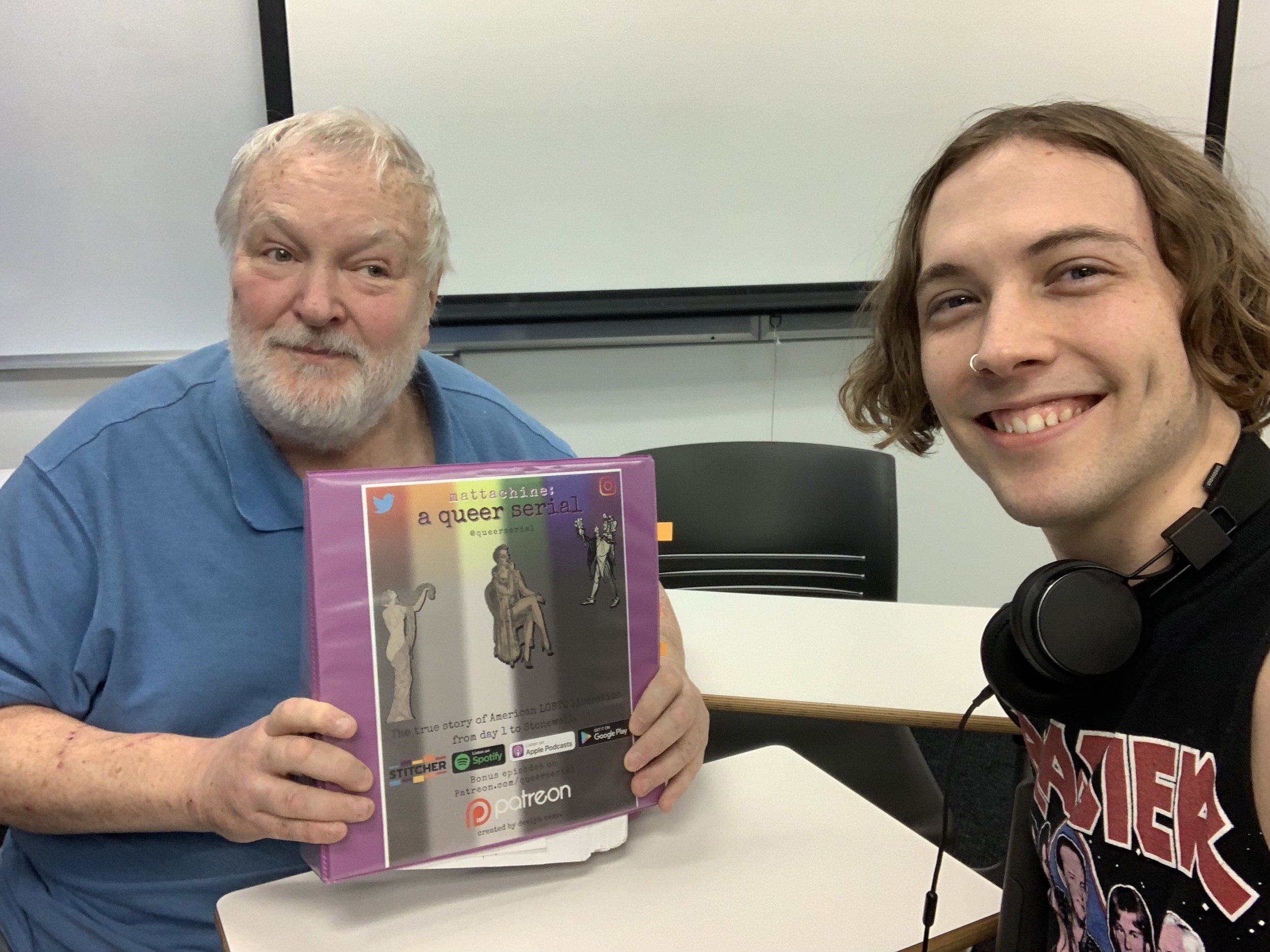Chicago
My interest in queer history started in Chicago, the same city where the organized American gay rights movement began, as told in episode 1 of Queer Serial. Over my years in the Midwest, I researched Chicago’s queer community countless times, met dozens of windy city queer icons, worked as a freelance journalist and a waiter in the gayborhood, and participated in the community as an activist.
This page is where I’ve collected all things Chicago in my work, which I dedicate to my mentor and dear friend, journalist & teacher Albert Williams. Scroll on to learn more.
—Devlyn Camp
Albert Williams & Devlyn Camp visiting a 2023 Gerber/Hart exhibit on Marge Summit and the Gay $ campaign.
Queer Serial episodes
that primarily feature Chicago
S1 E1
“Strange Sex Cult
Exposed”
What is Mattachine? Why are they anonymous? Our case opens with a postal worker in 1920s Chicago.
S3 E8
“Chicago Ain’t
No Sissy Town”
“Through the blue cigarette smoke you can make out the outlines of crowded tables.”
Meet me on Crilly Court.
S3 E9
“Mattachine Millennia,”
or, “The Whole World Is Watching”
“One gets weary of trying to confront the people with the necessity of assessing their own history.”
Queer Serial episodes & interviews
featuring iconic Chicagoans
Devlyn interviews Chicago writers
Joey & Elaine Soloway, March 4, 2022
A chat about creating work that uplifts minority voices, navigating an industry built for dudes, & how we blend art & activism to tell stories. Joey is the creator of Chicago’s The Real Live Brady Bunch and Amazon’s Transparent, among many other shows.
S2 E13
“Making This Movement Move”
Season 2 finale, guest starring Chicago drag legend Joan Jett Blakk reading the words of Dr. Martin Luther King, Jr.
Interview w/ Jon Martinez,
voice of José Sarria!
Chicagoan Jon Martinez talks about growing up in the city and voicing drag icon José Sarria on Queer Serial.
Bonus episode: “1968 & 2020”
w/ Chicago Gay Liberation's
Gary Chichester
Gary was at the very first march for gay liberation—in Chicago, a day before New York & LA—on June 27, 1970. He was also present for the 1968 DNC police riots, both of which were covered on Queer Serial. We discuss the similarities to 2020 in this bonus episode, also published as a piece in the Chicago Reader.
The history of Northalsted
a.k.a. “Chicago’s Proudest Neighborhood”
f.k.a. “Boystown”
On the Mic:
OutSpoken LGBTQ+ Storytelling
LIVE AT SIDETRACK IN CHICAGO
Every month, people from all over Chicago gather at Sidetrack, one of the city’s longest-running gay bars, to hear stories told live by LGBTQ+ people (and even some cis heteros!).
Now, we’re going back into the archives — 6 years of archives — to bring the stories to you.
Hosted by Kim L. Hunt, Art Johnston, & Archy Jamjun
Artistic Creator David Fink
Stage Manager Brad Balof
Audio/Visual Tech Bryan Smith
Podcast Producer & Host Devlyn Camp
More info at sidetrackchicago.com
Bonus episode to the left:
Devlyn at Outspoken:
LGBTQ Storytelling
A 2018 story about discovering my gender while producing the first season of Queer Serial.
Writing for the Chicago Reader
What I learned about gay pride from the Mattachine Society
June 22, 2018
Dugan’s Bistro and the Legend of the Bearded Lady looks back at a time when River North was full of drag queens and glitter
March 6, 2019
Pride double standard? Bars upset after police forced some to close early after parade
June 29, 2018
Why should the government interfere with the very personal process of gender identity?
October 26, 2018
Following the Van Dyke trial through the WBEZ podcast ‘16 Shots’
September 19, 2018
The bumpy road from Stonewall to Pride in the Park
Learn more about this story at queerserial.com/boystown
April 4, 2019
Patreon-exclusive episodes & archive dives
Join me on my Patreon for exclusive bonus episodes & archive dives! I’ll show you behind the scenes of creating the podcast, including documents like the one above, exploring archived gay newspapers like the ones below, and sharing fun queer ephemera like the 1960s gay coloring books drawn by Chicago artist Etienne a.k.a. Dom Orejudos.
Chicago LGBTQ+ history resources
Special thanks to the Gerber/Hart Library & Archives in Chicago for preserving our history and making it accessible to folks like me.
this page is Dedicated
to Albert Williams
Chicago journalist, theater artist, teacher, activist
(and Queer Serial voice actor)
Albert Williams was teaching Musical Theatre History at Columbia College Chicago in 2010 when we met. His passion for theater (and his use of Sheldon’s Patinkin’s book No Legs, No Joke, No Chance in class) showed me that history is much more interesting than the Hoosier teachers back home led me to believe. I learned more about world history from his Musical Theatre History course than any actual World History class back in Indiana. I had no idea at the time that Albert had a role in Chicago’s gay history. While working as Albert’s assistant for the college’s Musical Theatre program he told me about the Mattachine Society, and now here we are.
In my 14th year of knowing him, Bill is still telling me stories from his past. Over the year's I’ve tried to collect them all to be sure his legacy is recorded. Bill has been a mentor to countless other students and artists across Chicago, and I’m sure many stories can and should be added to this collection. (If you have any suggestions, please contact me.)
Early life (1950-1968)
Raised in Denver, Colorado, Albert Williams moved with his family to Evanston, Illinois in October 1962, where he enrolled at Haven Jr. High School after the fall semester had already started.
Albert’s publishing career began there, after meeting fellow student Jim Dexter who "published” Albert’s horror movie fanzine Terror in exchange for Albert’s contributions to Jim’s Mad Magazine-style fanzine Idiot. They wrote articles and drew stories such as movie parodies on two-colored ditto paper, often tracing movie photos to create illustrations.
Albert began spending summers at Harand Camp, a summer camp devoted to teaching musical theatre. The camp was housed on the site of the old Osthoff's resort in Elkhart Lake, Wisconsin, pictured in the first set of photos to the right. Every building and cottage was named after a Broadway musical. The main building in the middle Osthoff photo later became “Wonderful Town,” and the lakefront cabin in the bottom photo would be called “South Pacific” when Albert attended as a teenager.
Albert also participated in Evanston Children’s Theatre productions such as Alice in Wonderland and Emil and the Detectives, performing in the Haven auditorium. Below are photos from Albert’s 1968 yearbook, featuring Evanston Township High School’s summer 1967 production of The Pajama Game, and images of the school’s production of Surely You Jest! in which Albert played Count Laslo Von Zonk.
Albert’s father, Albert N. Williams
Before Bill’s birth, his father was editor-in-chief for Voice of America during WWII, radio columnist for the Saturday Review of Literature, and a successful radio producer at 30 Rockefeller Plaza. Some his programs are available to listen to here. (Radio was in the family, as his first wife Martha Rountree developed NBC’s Meet the Press.) Williams produced & directed episodes of NBC’s Listener’s Playhouse, and in 1940, while America was turning away Jewish refugees, he wrote a radio play for NBC called "This Land of Refuge,” described as follows: "Now, in these years of sorrow, there are those suffering and betrayed people in the other half of the world that seek refuge and shelter inside the strength and peace we built in this half of the earth. Here are men and women like ourselves, and children who will rule tomorrow's world! Unless we take them in, they will be driven to death!" The show was broadcast on June 4, 1940.
After his divorce and second marriage, Williams moved to teach commercial radio at the University of Denver. In 1948 he published Listening, a book collecting 32 of his essays on radio from the Saturday Review. He went on to write several books on religion, once even saying to his young son Albert, “I don’t go to church, I write about it.”
His son would later follow in his father’s journalistic footsteps in many ways, including performing as a voice actor on modern radio, starring as Mattachine President Frank Kameny in the podcast Queer Serial.
Indiana University (1968-69)
As a freshman at Indiana University, Albert wrote for an independent student publication called The Ballantonian. He wrote several articles in Volume III of the publication between September and December of 1968, most of which were film reviews, including Barbarella and The Boston Strangler, and some political pieces.
Gay Liberation Front members march through Bughouse Square (now Washington Square Park) on their way to rally at the Civic Center (now Daley Plaza) on June 27, 1970. Chicago Tribune.
Chicago Gay Liberation (1970)
Albert was a teen member of Chicago Gay Liberation, the small group that organized America’s first Pride march, on June 27, 1970, from Bughouse Square to Daley Plaza. Read about his experience that day here.
His first Gay Liberation event was a protest four months earlier, as he recalled in 2019, “on the snowy afternoon of Wednesday, February 25, 1970, outside the Loop headquarters of the Women’s Bar Association of Illinois. The group was hosting a program on ‘Youthful Offenders’ with a Chicago police officer, Sergeant John Manley, as guest speaker. But for us, the offender was Manley himself. The blond, muscular cop was notorious for entrapping gay men in Lincoln Park restrooms.”
The next month, Gay Lib staged a demonstration for the release of The Boys in the Band, a film adaptation of the 1968 hit play. Albert wrote in 2019, “Our aim was not to boycott the movie—which used waspish humor to illustrate the pathological, self-hating behavior of a group of gay New York men—but to use it as a teaching opportunity. We handed out flyers on the street outside the Carnegie Theatre on Rush Street (where Gibsons Bar & Steakhouse is now), which read in part: ‘The pain and cruelty typified by The Boys in the Band should be understood as the expression of human lives damaged by an environment of condemnation, suspicion, job discrimination, and legal harrassment [sic].’”
Gay Lib also organized dances, the first two of which were hosted on the University of Chicago campus. The dances became so large that the event moved to the Coliseum on South Wabash, where many of Chicago’s earliest 20th century queer dances were hosted, as discussed on Queer Serial. In his piece “Beyond Stonewall: How Gay History Looks Different From Chicago,” Chicago queer historian Timothy Stewart-Winter describes the first new Coliseum dance on April 18, 1970: “There was a problem: The venue required an insurance policy, and every insurance agent the organizers approached said the risk was too great that the police would raid the dance, cart the attendees off to jail, and levy fines. Only on the day before the dance did the activists find a broker who’d sell them a policy—a black man whose company had insured the Nation of Islam’s annual convention at the same venue.” About 2,000 people attended, as Albert recalls, “So did the police. But when the cops entered the hall and came face to face with a phalanx of attorneys—including the formidable Renee Hanover—primed to document any civil liberties violations, they shrugged and went away.”
Feast of Fun: Gay Talk Show
Episode #2874
June 10, 2020
“Today, the long time theater editor for the Chicago Reader Albert Williams, joins us to talk about planning and attending the first Pride March in Chicago and how it connects with the Black Lives Matter Protests happening now.”
Albert talks about post-Stonewall gay culture, joining Chicago Gay Liberation, and attending the first Pride march in 1970.
The Free Theatre (1970-1974)
At age 19, Albert Williams joined the Free Theater as a performer and writer in the seminal ensemble of Chicago’s off-Loop theater movement. He also co-wrote several musical theater works, including the libretto for a children’s opera, William Russo’s “The Golden Bird,” which premiered in 1984 at Orchestra Hall under auspices of the Chicago Symphony Orchestra.
Learn more about the Free Theatre in this WBEZ piece featuring quotes from Albert.
“In 1973, Alderman Dick Simpson of Chicago's north side, heavily LGBT 44th Ward sponsored a ward fair at St. Alphonsus Church. The Free Theatre, of which I was a member, was one of many 44th Ward-based organizations that participated. When we got there, we learned that the Gay Horizons social service organization was denied a booth in the fair at the direction of the Chicago Roman Catholic Archdiocese. So after we performed, we joined a picket line in front of the church. Studs Terkel, a featured speaker, showed up and asked what the problem was. When we told him, he went into the church and spoke briefly, chastising the church for denying Horizons a booth. ‘You would have crucified Christ because he was different,’ Studs declared, before walking off the stage, out of the church, and (briefly) joining our picket line.”
—Albert Williams
Albert Williams in his Free Theater rock cantata Dangerous Teachings, which he composed to poems by Bertolt Brecht, 1973.
Freeze (1976-1979)
In 1977, Albert joined the band Cwazy Wabbit, singing vocals and playing keyboards. The band was started in 1976 by Albert’s former Chicago Free Theatre colleagues Bill and Caren Schneider. In ‘77 they changed their band name to Freeze. Albert left the band in 1979, which broke up soon after.
Meanwhile, Albert began working as a journalist. The Illinois Entertainer was the first publication that paid for his articles, including interviews with musicians and record reviews.
Listen to a couple songs by Freeze below:
Matt Baume’s podcast The Sewers of Paris
Anita Bryant, God Bless Her (Ep. 120: Gore Vidal)
June 29, 2017
In this podcast, Albert tells many stories, including his experience at the Anita Bryant protest at Medinah Temple. Albert wrote in 2019, “On June 14 [1977], singer, orange-juice industry spokeswoman, and former Miss America Anita Bryant arrived in Chicago for a concert at the historic Medinah Temple at Wabash and Ohio (it’s now a Bloomingdale’s home furniture store). The concert had been booked before Bryant achieved national notoriety as leader of an anti-LGBTQ initiative in Dade County, Florida. LGBTQ activists, including me, picketed the Bryant concert in Chicago, despite being cautioned by gay establishment leaders that our action would be an embarrassing failure. By then, it was thought, the activist energy of the early 1970s had waned, and the only time queers turned out en masse was for the Pride Parade. But a spontaneous, unexpected turnout of 3,000 to 5,000 (depending on whom you ask) proved the naysayers wrong.”
Listen to Albert tell the full story, and many others, on Matt Baume’s podcast The Sewers of Paris. Listen to the podcast on iTunes here.
What's the difference between an end and a beginning, and are they sometimes the same thing? My guest this week is Albert Williams, a longtime queer artist and activist who's seen the queer world transform over the course of his life. Throughout that time, there were periods when change just wasn't coming fast enough, and that's when he and his friends found ways to force one era to end and a new one to begin.
—Host Matt Baume
GayLife (1981-1985)
Albert was managing editor of GayLife newspaper from 1981 to 1985.
“I started writing for GayLife because I had become friends with the paper's editor, Stephen Kulieke, when I was singing in a rock band in the 1970s. Later Steve shifted into the job of lead reporter and gay activist Michael Bergeron became editor; when Mike moved to New Orleans I took over as editor in July of 1981… Fascinating to realize how ‘Life is what happens to you while you're busy making other plans,’ as John Lennon (and others, I'm sure) said.” —Albert Williams, 2020
GayLife art director Danny Kofoed, National Gay and Lesbian Task Force leader Bruce Voeller, and GayLife editor Albert Williams at the Chicago GayLife office on Huron Street, summer 1981.
“The following July, I attended the conference in Washington, D.C. at which Bruce, representing NGLTF (we pronounced it Niggletiff), proposed the term ‘Acquired Immune Deficiency Syndrome’—AIDS—as a replacement for ‘Gay-Related Immune Deficiency’—GRID.” —Albert in 2021
Stories from
A night out with Divine
“The previous weekend, underground film star Divine had performed a Halloween show at Park West to promote his new single ‘Born to Be Cheap’ released by Chicago-based Wax Trax! Records The night before the show, my GayLife colleague Bob Bearden and I—joined by Wax Trax owners Jim Nash and Dannie Flesher and Divine's manager Bernard Jay—escorted Divine on a club-hopping p.r. tour that took us to the new wave disco Neo and elsewhere. The next day, Divvie signed records at Wax Trax Chicago on Lincoln Avenue.” —Albert, 2020
GayLife, November 6, 1981. Photo by Albert Williams.
Emergence of the AIDS epidemic
“This is the first edition of Chicago GayLife newspaper that I put out as editor in chief, highlighting my lead story about how Chicago's gay community was responding to alarming reports of a ‘gay cancer’ emerging on the coasts. The trigger for this alarm was an article in the New York Times July 3, 1981, headlined ‘Rare Cancer Seen in 41 Homosexuals’—the first signs of the AIDS epidemic to come. My tenure as editor of Chicago's then LGBT paper of record coincided exactly with the emergence of the AIDS epidemic.” —Albert, 2020
Move to Man’s Country
“A Thanksgiving greeting to our readers introducing the paper's staff as we announced that we would soon be moving out of our River North offices to ‘Renslow Plaza,’ as we nicknamed the building complex that publisher Chuck Renslow owned at 5015-23 N. Clark. The site was already home to Chuck's bathhouse Man's Country and relocating the newspaper to the same site made sense.” —Albert, 2020
Larry Eyler investigation & Freed to Kill book
In late December 1982, while Albert was still working for GayLife, a "missing person" report on 25-year-old bar worker J.J. Johnson turned out to be the first coverage in GayLife of what, over the next several years, was revealed to be a horrific serial murder spree in Illinois and Indiana. Johnson's body was discovered the following month in Lowell, Indiana. Albert wrote in 2021, “Eventually, as more young men went missing and more bodies were discovered, GayLife was approached by WLS-TV (Chicago's ABC affiliate) news assignment editor Gera-Lind Kolarik to help make connections among the victims that led police in both states to share information that eventually led to the identification of Larry Eyler as a suspect. Kolarik acknowledged GayLife's contribution to the Eyler case in her 1990 book Freed to Kill. GayLife reporters Karlis Streips and Paul Cotton did a great job of covering the case as it unfolded, and my friend Jon-Henri Damski covered the Eyler case as a columnist for GayLife and, later, Windy City Times. Damski's articles about the Eyler case are included in "Nothing Personal: Chronicles of Chicago's LGBTQ Community 1977-1997," a 2009 anthology of Damski's journalism that I co-edited with Owen Keehnen.”
In 1986, Eyler was convicted and sentenced to death for the 1984 kidnapping and murder of teenager Danny Bridges. Eyler subsequently confessed to more than 20 murders, and died of AIDS-related complications in 1994 while incarcerated on death row.
Albert is mentioned a few times in Gera-Lind Kolarik and Wayne Klatt’s book Freed to Kill: The True Story of Larry Eyler, featured in the images here.
When GRID became AIDS
“I attended the conference of government health officials, medical specialists, and activists from the LGBT and hemophiliac communities at which the term AIDS was identified as the agreed-upon diagnostic term—a major step forward for epidemiological and treatment purposes, but also for fundraising and political messaging. The conference was held in Washington, D.C., on July 27, 1982. At the time, the then-mysterious but rapidly escalating epidemic was referred to by various terms—including ‘Gay-Related Immune Deficiency,’ or GRID, because at the time the illness seemed concentrated in the gay male community. As Dr. Anthony Fauci said at the conference, ‘GRID is the most unfortunate term we've come across in a long time.’ I was invited to attend the conference by my fellow journalist Larry Bush because, by luck or fate, I happened to be in D.C. en route to New York City. At the time, I was on leave from my post as editor-in-chief of Chicago GayLife newspaper and preparing to fly to England for a three-month visit. Thus I was able to attend the historic AIDS conference—and to cover it for GayLife, making me one of a handful of representatives of the LGBT press to do so. Randy Shilts was also there, and he chronicled the event in his must-read book And the Band Played On. After the conference I used a telephone in the office of U.S. Rep. Henry Waxman (D-Calif.), who had convened the conference, and dictated my report by phone to my GayLife colleague Chris Heim, who turned it into the page-one article posted here. Happily, GayLife is archived at Gerber Hart Library and Archives in Chicago's Rogers Park neighborhood.” —Albert, 2020
Chicago Reader (1985-present)
In their 2021 piece “Queer History Through the Eyes of the Reader,” Chicago Reader journalist Adam M. Rhodes cites Albert Williams as “the Reader’s go-to queer voice as well as a theater writer when he signed on with the paper in 1985."
Albert began working with the Reader in 1983, when writers & editors such as Brent Staples, Neil Tesser, and Patrick Clinton turned to Albert as an on- and off-the-record source for LGBT-related stories while he was editor of GayLife newspaper. When Albert decided to expand his journalistic outreach beyond the LGBT community, the Reader invited him to join its pool of writers. He started as a freelancer and eventually spent more than a decade there on staff before returning to his current freelancer status.
Albert’s first important article in the paper, published in April 1985—a month after leaving GayLife—was a report on the life and death of the actor J. Pat Miller, one of the first prominent Chicagoans whose death was acknowledged as AIDS-related. The article (pictured on the right) paved the way for the establishment of Season of Concern (see below), the organization that provides financial aid to Chicago theatre artists impacted by AIDS and other catastrophic illnesses.
Over the past 30+ years, Albert has covered film and music as well as theatre and LGBT issues for the Chicago Reader. Among the Reader articles he is particularly proud of are his 1988 cover story about Geese Theatre, a company that brought theatre workshops into prisons; a 1988 interview with Chicago-journalist-turned-Hollywood-comedy-writer Bruce Vilanch; a 1989 profile of gay actor/AIDS activist Michael Kearns; a 1991 report on the establishment of the Chicago Gay and Lesbian Hall of Fame; a 2008 profile of former Chicago gay activist Frank Robinson (later speechwriter for Harvey Milk); a 2018 interview with Rebecca Makkai about her novel "The Great Believers"—a fictional account of the AIDS crisis set in Chicago at the time Albert was editor of GayLife and Windy City Times; and his 2019 reflection on the 50th anniversary of Stonewall from his perspective as a onetime "freaking fag revolutionary."
Albert’s Chicago Reader theater reviews won the 1999-2000 George Jean Nathan Award for Dramatic Criticism. As the only Chicago-based critic to have won that national prize, he received letters from Mayor Richard M. Daley and city Cultural Affairs Commissioner Lois Weisberg honoring him as a leading cultural figure in the city. The selection committee wrote: “Albert Williams writes the kind of criticism for which the George Jean Nathan Award was designed—incisive, thorough, confident in the intelligence of its readers, and convinced that theatre makes a difference to the city in which it occurs…. This is generous and fair-minded reviewing, achieving a consistently high quality.”
Albert has also been a contributor to the Chicago Seed, The Advocate, and the New York Times Book Review.
Arts Against AIDS (1985)
In 1985, Albert co-produced “Arts Against AIDS,” a benefit show at Second City that launched what would become the AIDS support agency Season of Concern.
Columbia College (1985-present)
Albert is a 1973 graduate of Chicago’s Columbia College, and has served on the Columbia faculty since 1985, teaching theater and music courses, and advising on LGBT issues. Below you’ll find highlights from Columbia’s publications & productions featuring Albert throughout the years.
Albert told Columbia’s DEMO Magazine in 2007 about his class commencement ceremony in 1973. He was listening to then-president Mirron “Mike” Alexandroff address the audience of about 800 people. Williams told DEMO, “I sat there and thought, the president of this college is hipper and more radical than the students…I was so happy to be here.”
“He still is,” DEMO reported, “Williams, who graduated in 1973 and has taught at Columbia since 1985, is the first faculty/staff donor to the Alexandroff Legacy Society—a new giving society established to honor Alexandroff’s vision and recognize individuals who choose to remember the college in their estate plans. ‘When I heard about the Alexandroff Legacy Society, I thought, this is great!’ says Williams. ‘I wanted to do this for Mike, for his family, and for the college and the students. I’ve always considered the college my other family. I don’t have heirs of my own, so I’m happy to make the students my heirs… I’m also impressed by the extent to which the college has stayed true to Mike Alexandroff’s vision of a cutting-edge, culturally, economically, and educationally diverse college. Aside from serving as a crucial longterm fundraising project, I hope the Alexandroff Legacy Society helps keep Columbia rooted in Mike’s vision.’”
According to Columbia College’s Development and Alumni Relations, in 2008, “Williams made one of the first estate gifts to Columbia by a faculty member, in recognition of his mentors Mike Alexandroff and William Russo (former Chair of Music). His reason for making a generous commitment in his estate plans is the same today as it was then: to ensure that future generations of students have a chance to thrive at Columbia. Through the challenges of the past few years—from the COVID-19 pandemic to the racial reckoning experienced in Chicago and cities across the country—Williams is continually aware of how invaluable Columbia is for its students who flourish in a community that is grounded in creativity and open-mindedness.
“‘Columbia helps students find a way to live their most authentic and creative lives. Now more than ever, I’m aware of how precious that is.’ As we recognize national ‘Make a Will’ month this August, and reflect on the people and institutions that have made a life-affirming impact on us, we give thanks to Williams for his inspiring gift to Columbia. ‘It means a great deal to me to help keep the college going forward in this way,’ says Williams. ‘Despite the challenges and times we have faced, I hope my gift will allow Columbia to continue to thrive and grow.’”
Windy City Times (1987)
Albert served as managing editor of Windy City Times, Chicago’s LGBT community newspaper of record, from May through December of 1987.
During this time he also co-founded Gay and Lesbian Town Meeting, the organization that led the victorious campaign to pass the LGBTQ-inclusive Chicago Human Rights Ordinance in 1986-88, and the Coalition Against Media/Marketing Prejudice in 1987. Albert also volunteered for Mayor Harold Washington's 1987 re-election campaign and gay activist Ron Sable's 1987 44th Ward aldermanic campaign.
In 1991 Albert was given the Peter Lisagor Award for Exemplary Journalism in Arts Criticism for his cinema reviews in the Windy City Times.
1986-87 “Gay $” campaign
Albert recapped the story in 2023, writing, “In 1986, Evergreen Foods was the center of controversy when the Evergreen Gazette, a weekly free newspaper which consisted mostly of ads for the store's weekly specials but also ran some classified ads and filler copy, published a column by a Lakeview community busybody that called for compulsory HIV antibody testing in conjunction with voter registration. At the time, the LGBT community was in the midst of a huge voter registration drive led by the tireless NJ Sloan as we geared up for the upcoming 1987 elections, in which gay activist Ron Sable was preparing to run for 44th Ward alderman against incumbent Ald. Bernie Hansen. The Gazette's editor, Anne Godden Segard, urged owner Jim Vrettos not to publish the column, but Jim misguidedly allowed it to run, prompting Anne to resign in protest. The Gazette, responding to a flood of outraged letters from community members, published an apology. But a boycott of Evergreen ensued—promoted in the pages of publisher Jeff McCourt's weekly paper Windy City Times—as people went into the store, filled their shopping carts (with non-perishable items), and then abandoned the carts and walked out. Then‚—with Kit Duffy, Mayor Harold Washington's liaison to the LGBT community, acting as a mediator—the economic sanction was called off after Jim Vrettos agreed to donate $500 to the lesbian/gay community to be used for health education and to publish an educational article about AIDS in the Gazette.
As a followup to the Evergreen action, bar owners Marge Summit (His 'n Hers) and Frank Kellas (the Gold Coast) organized a campaign in which paper currency was stamped with a ‘Gay $’ logo. The bills flooded local stores—including Evergreen—and banks, proving the economic and political power of the LGBT community. When a neighborhood bank, Lakeview Bank at Diversey and Pine Grove, refused to accept the money, we boycotted the bank, with LGBT account holders withdrawing their accounts, leading to its closure. Marge Summit, who died earlier this year, recalled the Evergreen boycott and Gay $ campaign in a 2017 Windy City Times interview with Owen Keehnen, posted here. According to Lee Newell (shared from another post): ‘Lane Banks, owners of Lakeview Bank, closed that bank due to the outflow of millions of dollars and quietly, the next year, want out of business. A success story that went uncelebrated in our community. It was the head of Lane Banks that called the Feds about defacing US currency with Gay $ stamp, IIRC. I do know he was the one who told the publisher of Windy City Times at we should go back into the closet, or words to that effect, which led to the demonstration and boycott.’ The publisher of Windy City Times was Jeff McCourt, and it was very foolish of the Lane Banks guy to cross him. Jeff manipulated the situation brilliantly, and ended up securing big ad $ for Windy City Times from both Evergreen Foods and Midtown Bank, where many people who closed their accounts at Lakeview transferred their accounts. Here's a photo of the Lakeview bank picket; among those pictured are Daniel Layman (who provided the photo - he's the one holding the sign), Illinois Gay and Lesbian Task Force reps Rev. Ninure Saunders and Arthur Schenck, and mayoral liaison Kit Duffy.”
In 2023, after we stumbled upon these photos of Albert at the Lakeview bank protest led by bar owners Marge Summit and Frank Kellas, Albert also wrote, “I never realized (or had forgotten) that I am in two of the pictures, which were shot by Lee Newell for Windy City Times when a group of activists (including me) picketed Lake View Bank (on Diversey at Cambridge) for its opposition to processing dollar bills marked with our ‘Gay $’ stamp. In the two larger photos in the upper right of the picture, there is a photo of Frank and Marge; in the photo, to the right of Marge (behind her) is Linda Henderson (then a Windy City Times sales exec), and I am talking to her (but all you can see is a bit of my face). I think you can see Laurie Dittman behind and to the left of Frank. In the other pic, Daniel Layman is seen holding a sign (in the checker-print trousers). I am to Dan's left (facing away from the camera); next to me is Windy City Times publisher Jeff McCourt (in the dark coat). We are talking to Kit Duffy (who is facing the camera). I think that's Arthur Schenck next to Kit (his face cut off by McCourt's head). It looks like it was a cold day (early 1987, Jan. or Feb.), but we had a hot time.”
Covering AIDS, the Chicago Human Rights Ordinance,
& Mayor Harold Washington’s death
Albert recalled in 2021, “The paper's Decemeber 3, 1987, issue carried an analysis by me of the legacy of Mayor Harold Washington, who had died suddenly from a heart attack on November 25. In my article, I examined the transformative political and policy impact Washington and his handpicked personal liaison, Kit Duffy, had on the LGBT communities of Chicago, while speculating on next steps in the wake of his death. The essay ran as part of a special section memorializing the late mayor. Washington died on the Wednesday before Thanksgiving. That afternoon I was in the office of Windy City Times, then located in a loft building behind the Frank M. Rodde Community Center at 3225 N. Sheffield, forerunner to today's LGBTQ-focused Center on Halsted. That week's early-deadline edition of WCT had just come back from the printer; its centerpiece was the entire draft text of the revised, LGBT-inclusive Chicago Ordinance on Human Rights, which activists intended to introduce in the Chicago City Council after it had been vetted, debated, and revised through an open community process. Publishing the ordinance draft was Windy City Times doing its part as the community's paper of record. My friend Rick Garcia, one of the leaders of the ordinance campaign, dropped by the WCT office that day to pick up the paper. We were alone together when the news came over the radio that Mayor Washington had suffered a heart attack at City Hall. I immediately called Kit Duffy, who was working in the suburbs. It was my painful position to be the person who gave her the devastating news. While she sped to Northwestern Memorial Hospital, where the mayor had been taken and where he was pronounced dead, Rick Garcia and I adjourned to Bulldog Road, a gay bar—nearly empty at that time of day—to watch events unfold on TV while bartender Gary Chichester served us drinks and joined us in our death watch. Harold Washington's death, besides being a human tragedy and a loss for the entire city, seemed to be a setback for the Human Rights Ordinance effort. But in the subsequent months, the activist organization Gay and Lesbian Town Meeting—which I had cofounded in 1986—brilliantly adjusted to the altered and unstable political landscape under the leadership of Rick Garcia. Laurie Dittman, Arthur Johnston, and Jon-Henri Damski.”
Read Albert’s brief history of the fight for the ordinance in his 2018 Chicago Reader piece “‘Convert them, co-opt them, or kill them’: The ugly fight to pass the LGBTQ-inclusive Chicago Human Rights Ordinance.”
Albert wrote in 2021, “Rick Garcia, Devlyn Camp and I spent the day Saturday in a time machine—figuratively speaking. We visited Gerber Hart Library and Archives and did a deep dive into their archives of Windy City Times newspapers from 1986-88. Our main focus was the two-year campaign of the community/activist organization Gay and Lesbian Town Meeting to pass the LGBT-inclusive Chicago Human Rights Ordinance. But so many other things were happening at the same time!
“There was the 1987 Chicago mayoral election, in which Mayor Harold Washington vanquished both former Mayor Jane Byrne (in her attempt at a political comeback) and Ald. Ed Vrdolyak (the corrupt leader of the anti-Washington faction in the Chicago City Council) to win a historic re-election as Chicago's first Black mayor. The 1987 election also saw a bold attempt by gay activist Ron Sable to unseat incumbent 44th Ward Ald. Bernie Hansen; though Sable lost, his strong showing affirmed and encouraged ‘gay clout’ as a factor to be reckoned with, especially given the heroic voter registration work of Sable supporter NJ Sloan. There was the 1987 March on Washington for LGBT rights and the concurrent unveiling of the NAMES Project AIDS Quilt on the National Mall, all of which I was proud to cover as editor of Windy City Times. There was the death of Mayor Harold Washington, a strong supporter of our work, and the subsequent struggle—both in the city at large and within the LGBT community—over whom to support as his successor. There were the CAMP (Coalition Against Media/Marketing Prejudice) and Gay $ grassroots campaigns to demonstrate LGBT economic strength and the power of boycotts, taking on institutions ranging from local banks and grocery stores to Kellogg's cereal. There was the hard-fought but ultimately unsuccessful effort to prevent lights from being installed at Wrigley Field. There was the historic fight over President Ronald Reagan's nomination of right-wing judge Robert Bork to the Supreme Court. (Bork was rejected by the Senate, and Reagan then nominated Anthony Kennedy, a conservative who, nevertheless, later provided needed swing votes in favor of abortion rights and LGBT rights.) There were many significant developments—locally and nationally, medically and politically in the continuing AIDS epidemic. There was the 1988 presidential campaign, in which Democrats were fiercely divided over whom to nominate. (LGBT delegates for various competing candidates, including Rev. Jesse Jackson, ran in the '88 primary.) And a month after that historic election, there was the final showdown in City Council over the Human Rights Ordinance - the victorious culmination of a 15-year effort.
“It was an exhilarating day of remembrance and rediscovery for Rick, Devlyn, and myself. But a bittersweet one too. as I encountered the names and faces of so man dear departed friends and colleagues. Kit Duffy, Jon-Henri Damski, Jeff McCourt, Sarah Craig, Al Wardell, Greg Sprague, Joe Gregg, Scott McPherson Remembered, and many many more . . . ”
Browse the issues with us chronologically!
Activist Rick Garcia:
Emlyn Williams
“Do playwrights and critics get along? Sometimes we do.”
Albert had a relationship with Welsh actor and playwright Emlyn Williams from 1981 to 1986. Learn more about Emlyn’s extensive theatrical career here.
They met when Emlyn appeared in his one-man Charles Dickens play at the Northlight Theatre, which Emlyn discusses with Chicago legend Studs Terkel here. To the right is a Showbill from the 1981 Broadway production before the tour. In 1982, Albert worked as Emlyn’s personal assistant on a tour of England, Wales, and Ireland.
Emlyn’s biography from the Showbill:
By 1951 Emlyn Williams was, in London and New York, an established actor-playwright: his best known plays being Night Must Fall (filmed with Robert Montgomery, later with Albert Finney) and The Corn Is Green (starring Sybil Thorndike and himself in London, Ethel Barrymore throughout America, and filmed with Bette Davis and, recently, Katharine Hepburn). He had also starred in The Winslow Boy (Rattigan) and Montserrat (Hellman), while his films had included The Citadel, The Stars Look Down, Major Barbara, Hatter's Castle, Ivanhoe, The Last Days of Dolwyn (which he also directed, having written it for Edith Evans and Richard Burton), and an historical curiosity, the unfinished I, Claudius. When, in 1950, he happened to read that in 1853 Charles Dickens had embarked on a second career as a "solo performer" of scenes from his books, it occurred to him that in our theatre, dialogue need not hold a monopoly: that the riches of the novelist might be adapted to create a special stage medium. After a year's preparation, he opened in London as Charles Dickens giving a "Solo Performance": a venture so successful that he found himself a pioneer. New York fol-lowed. From then on, between other ac-tivities, he has periodically returned to. Charles Dickens, as well as to his second "solo performance," Dylan Thomas Growing Up; he has taken them to Geneva, Ber-lin, Zurich, Amsterdam, Copenhagen, and on tours to North and South America, South Africa, Australia, New Zealand, Finland, Greece, Yugoslavia, India, Japan, and Russia. These travels culminated in a season at the Theatre Royal, Haymarket, London. The "other activities" have covered a wide field, including a Shakespeare season at Stratford-upon-Avon and appearances in New York: Thomas More in A Man for All Seasons and Pope Pius XII in The Deputy. He then played in his adaptation of A Month in the Country, with Ingrid Bergman and Michael Redgrave. His film appearances have included The Deep Blue Sea (with Vivien Leigh), I Accuse (with Jose Ferrer), The Wreck of the Mary Deare (with Gary Cooper), The L-Shaped Room (with Leslie Caron), The Eye of the Devil (with Deborah Kerr) and David Copperfield with Laurence Olivier and Ralph Richardson. In 1969, on television, he was a commentator on the Investiture of the Prince of Wales. His writing credits, too, have been considerable. His Doctor Crippen's Diary is included in Great Cases of Scotland Yard, a volume by eight well-known authors published by Reader's Digest. His adaptation of The Master Builder was presented by the National Theatre with Michael Red-grave, Maggie Smith, Laurence Olivier, and Joan Plowright. His main creative ac-tivity, however, has been another exten-sion, the writing of four books: George and Emlyn - early autobiographies; Beyond Belief ("A Chronicle of Murder and Its Detection"); and his first novel, Head-long, currently published by Heinemann in London, and by the Viking Press in New York.
Further accolades, awards, press, roles, citations, trophies, notorieties, crowns, et cetera et cetera et cetera, and so forth
Albert also held leadership positions with the Chicago Lesbian and Gay International Film Festival, the Gay and Lesbian Town Meeting, the Coalition Against Media/Marketing Prejudice, and other cultural and political groups. He has also written for the New York Times Book Review, the Advocate, Entertainment Weekly, American Theatre, Boston Herald, New Art Examiner, Stagebill, Chicago Sun-Times, Chicago Tribune, Chicago Free Press, and Chicago Seed. He is cited in No Legs, No Jokes, No Chance: A History of the American Musical Theater by Sheldon Patinkin (Northwestern University Press, 2008), and in Bigger, Brighter, Louder: 150 Years of Chicago Theater as Seen by Chicago Tribune Critics by Chris Jones (University of Chicago Press, 2013). Albert wrote the foreword and co-edited Nothing Personal: Chronicles of Chicago's LGBTQ Community, 1977-1997 (New Town Anthology Book 2) by Jon-Henri Damski (Firetrap Press, 2010). He also organized the Columbia College Chicago Theatre Symposium “Chicago, Theatre Capital of America: Past. Present. Future.” in 2011, a conference of Scholars, Practitioners, and Students Dedicated to History and Future Direction of Theatre in Chicago Presented by Columbia College Chicago at Film Row Cinema.
The Chicago LGBT Hall of Fame
In 2003, Albert was inducted into the Chicago LGBT Hall of Fame. His bio begins, “As a journalist, theater artist, teacher, and activist, Albert Williams has made important contributions to the cultural life of Chicago.”
Queer Serial (2017-2021)
Albert was the first person to tell me about the Mattachine Society. He’s the reason the podcast exists, and he also voices several parts throughout Queer Serial, including one of the main subjects, Mattachine President Frank Kameny. Albert also introduces each episode in the first season: “This is Mattachine!”
You can hear his voice in every single episode.
For this, and so much more, I am forever grateful.
xo Devlyn






